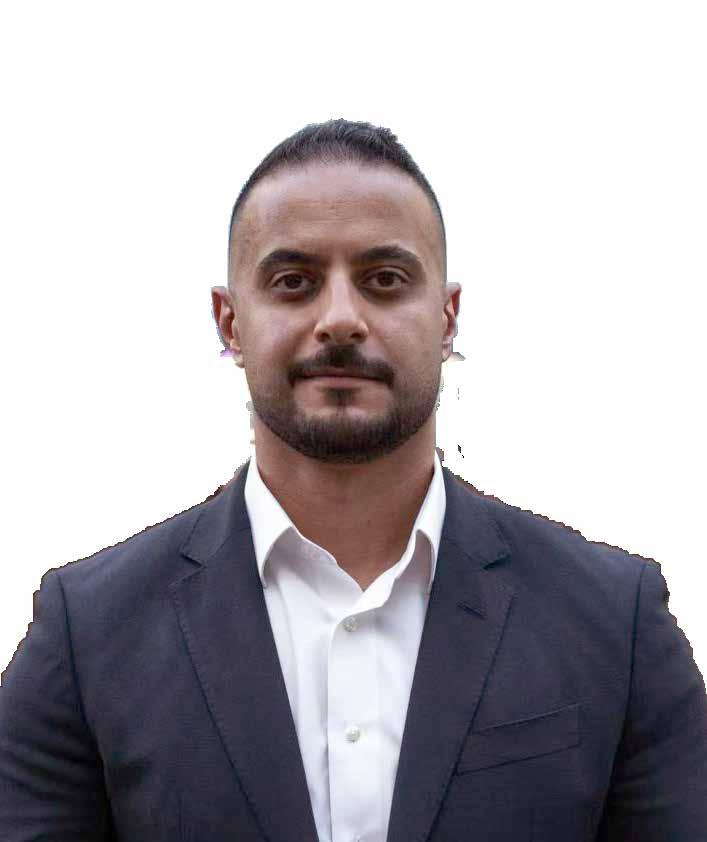

CIMC TIANDA


Drive the road of change.
Full offering
- Full range vehicles with the most advanced technologies
- Highly customized product driven by market needs and optimized Total Cost of Ownership
High capillarity of aftersales
- Repair and Maintenance contracts and competitive warranty conditions
- Origin 100% IVECO Parts and a widespread network coverage
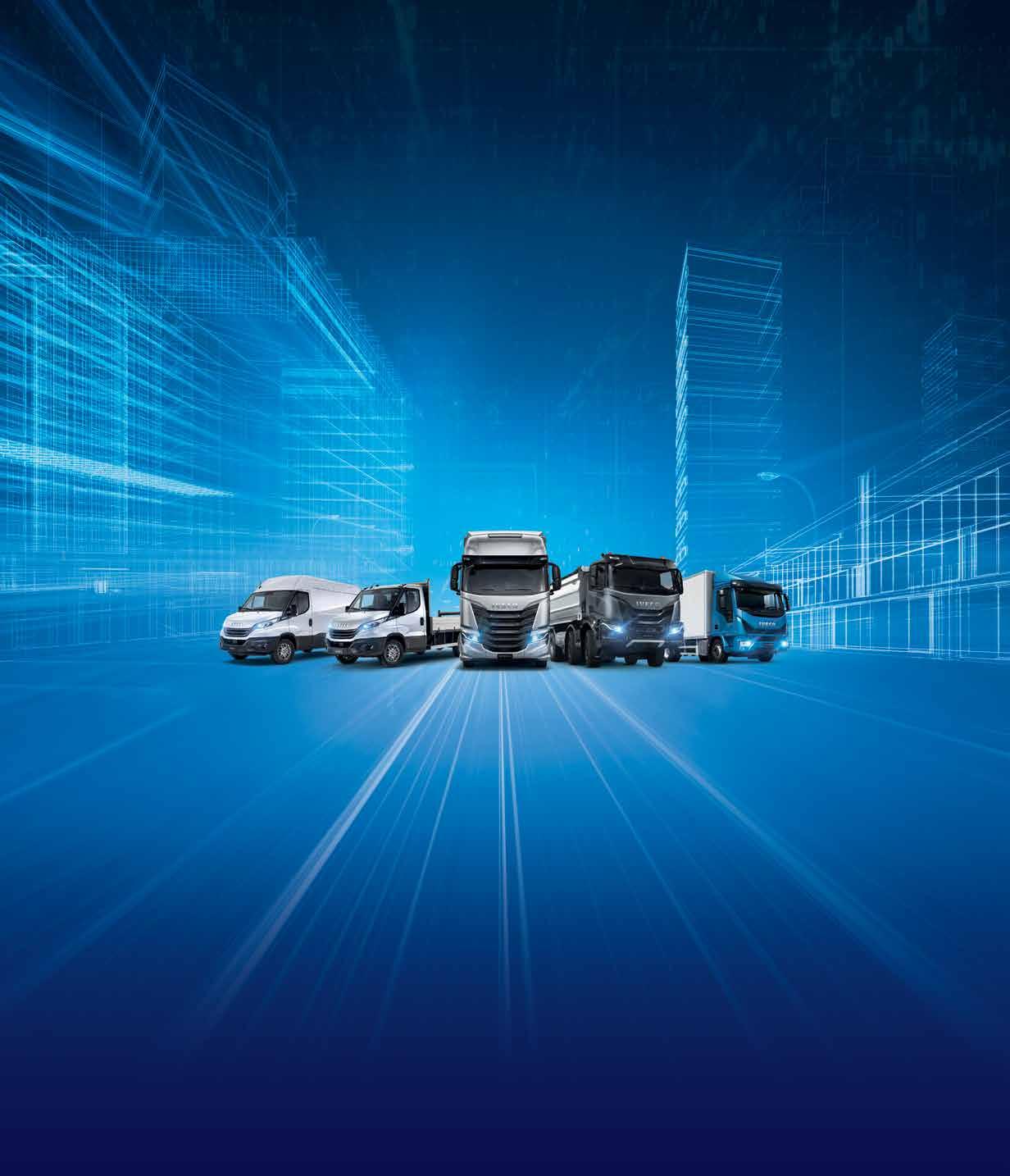
European technology
- High quality complete line-up in terms of tonnage, power, torque, safety, ergonomics
- High performance and robust trucks for extreme Off-road conditions
Customer centricity
- Comfort, ergonomics and the latest safety technology to make on board easier
- Driver Style Evaluation tool on Heavy ON-road range and optimized vehicle design to improve customer profitability
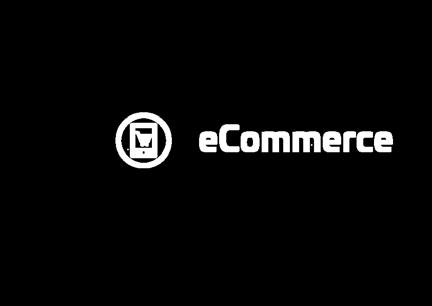

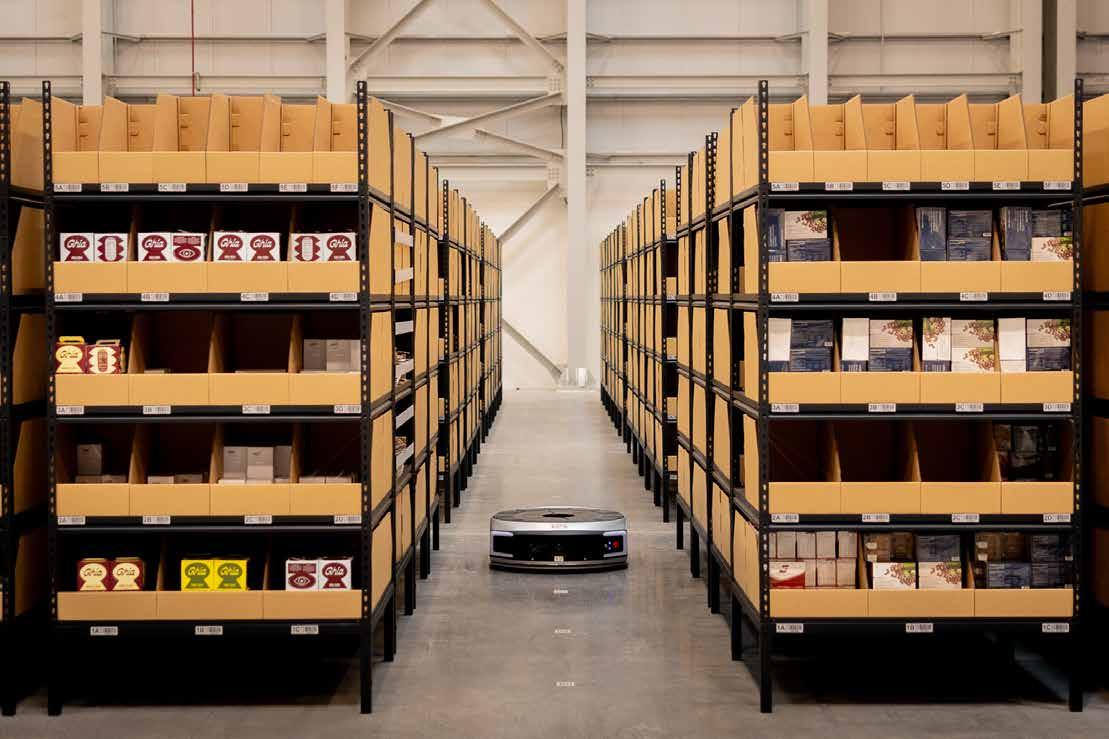


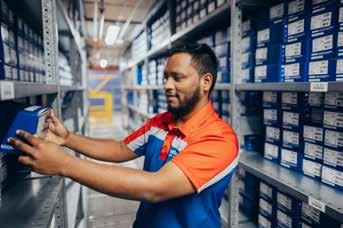
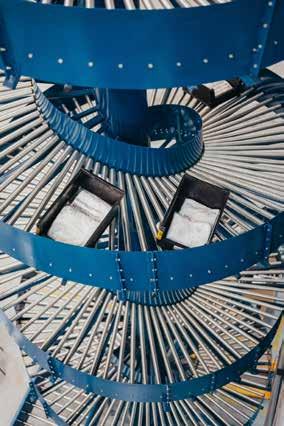
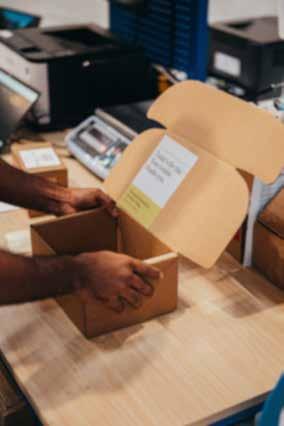
SIGNATURE MEDIA FZ LLE
P. O. Box 49784, Dubai, UAE
Tel: 04 3795678
Email: info@signaturemediame.com
Exclusive Sales Agent Signature Media LLC
P.O. Box 49784, Dubai, UAE
Publisher: Jason Verhoven jason@signaturemediame.com
Editor: Abigail Mathias abigail@signaturemediame.com
Art Director: Johnson Machado johnson@signaturemediame.com

It has been an eventful summer for the team at Global Supply Chain. We have met some outstanding individuals from the field and are delighted to bring you the cutting-edge innovations of our time.
For starters, CIMC Tianda offers a fascinating insight into automated warehousing. We take you on a intriguing journey to DHL’s innovative warehouses in the United Kingdom where robotics are bearing the load of heavy and voluminous deliveries. The company’s developments in pharma storage offer a window into healthcare management for the years to come.
Printed and Distributed by Masar Printing and Publishing L.L.C., Part of Dubai Media Incorporated Dubai, UAE
Contributor’s opinions do not necessarily reflect those of the publisher or editor and while every precaution has been taken to ensure that the information contained in this magazine is accurate and timely, no liability is accepted by them for errors or omissions, however caused. Articles and information contained in this publication are the copyright of Signature Media FZ LLE & SIGNATURE MEDIA LLC and cannot be reproduced in any form without written permission.
AEDLER Logistik Solutions, partnership with Kardex enhances intralogistics efficiency, while Positive Zero encourages the use of electric transportation. A more sustainable option, offering a less polluted environment for all of us.
IVECO announces its merger with Tata Motors and Swedish based Scania increases orders by 6 per cent. Both international trucking companies are paving the way for others in the industry to follow their success journeys.
We look at how an essential everyday commodity like rice goes through the vital supply chain to reach consumers on time. Reinstating the value that this industry brings to every table.
One of the leading shipbuilders in the Middle East, Grandweld Shipyards have been closely monitoring the environmental footprint of maritime activities. Their focus to generate renewable energy on a large scale is commendable. They share the ripple effect of sustainability both on sea and land.
All this and a plethora of news, views and engaging commentaries, make this issue a September to remember.
Welcome to another exciting edition.
Abigail Mathias Editor
abigail@signaturemediame.com www.globalsupplychainme.com
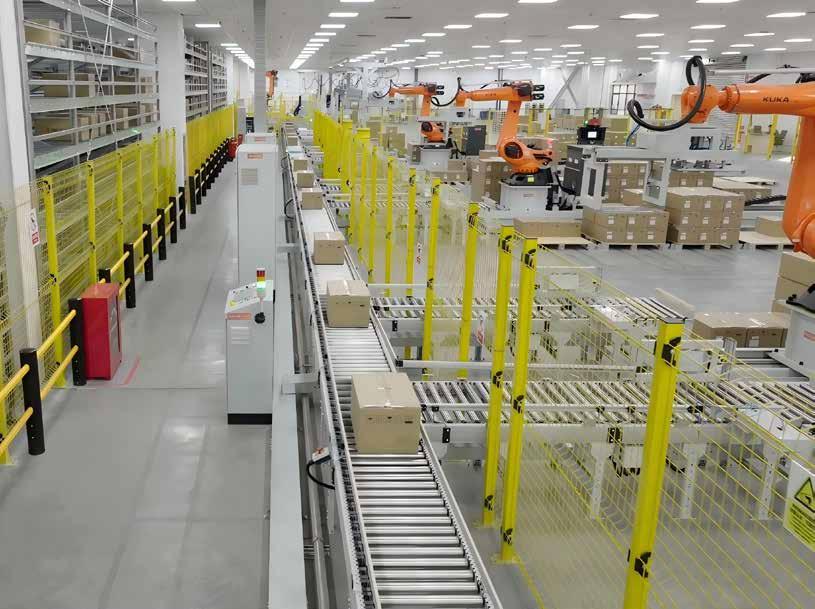
1500+
150+
CIMC Tianda: Engineering the future of automated warehousing
CIMC Tianda Intralogistics is a powerhouse in intelligent logistics automation, offering cutting-edge solutions for warehouse and supply chain operations across the globe. It forms a part of the larger CIMC Group, a major Chinese conglomerate with deep roots in industrial manufacturing and logistics. The company recently expanded in the Middle East with a strategic focus on automation in warehousing and logistics. With more than 45 years of experience and over 1,800 global projects, its strong international footprint is noteworthy. In an exclusive interview with Aron Schiller, Director CIMC Tianda Intralogistics, Global Supply Chain uncovers how seamless integration can be tailor made for almost every business model.
Gulf Supply Chain: In your opinion how do smarter logistics make the market more efficient?
Aron Schilller: Smarter logistics transform the market by enhancing visibility, transparency, and responsiveness across the entire supply chain. By integrating real-time tracking, predictive analytics, and automation, inefficiencies are minimised and decision-making is accelerated. This
not only reduces costs and lead times but also enables businesses to adapt quickly to market fluctuations, ensuring products reach customers faster and more reliably.
GSC: CIMC Tianda Intralogistics is leveraging AI-driven logistics solutions to streamline storage, ensuring efficient international trade. Can you tell us more about this?
AS: Absolutely. At CIMC Tianda Intralogistics, we deploy advanced AI algorithms to analyse inventory patterns, forecast demand, and optimise storage allocation. Our “AI+WMS” system enables end-to-end warehouse automation through an “AIoT real-time perception + intelligent decisionmaking” framework. This includes dynamic path optimisation, intelligent task allocation, and real-time inventory alerts.
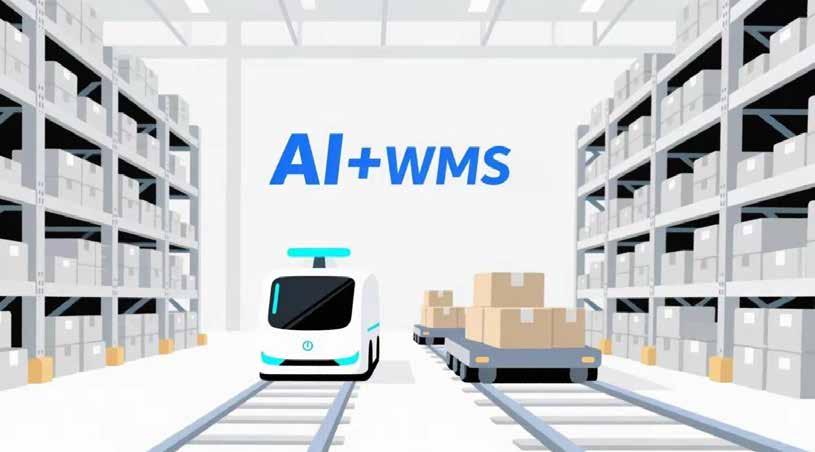
“Smarter logistics transform the market by enhancing visibility, transparency, and responsiveness across the entire supply chain.”
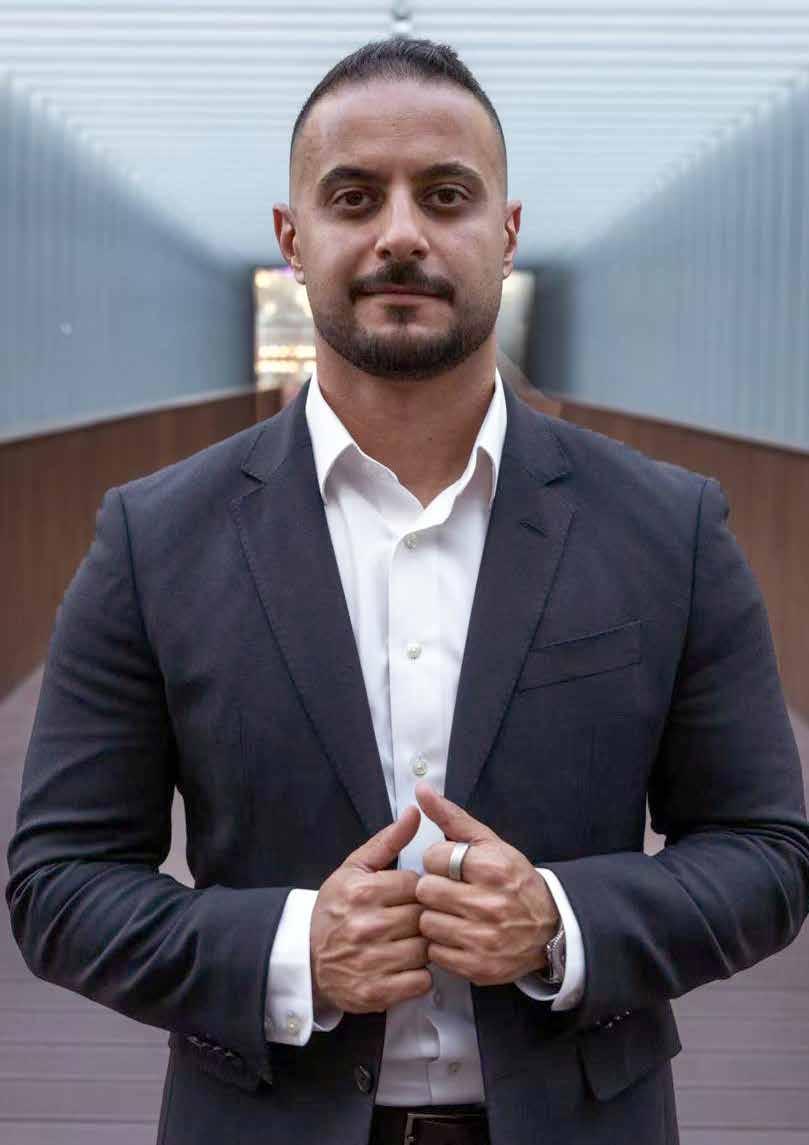
Aron Schiller Director CIMC Tianda
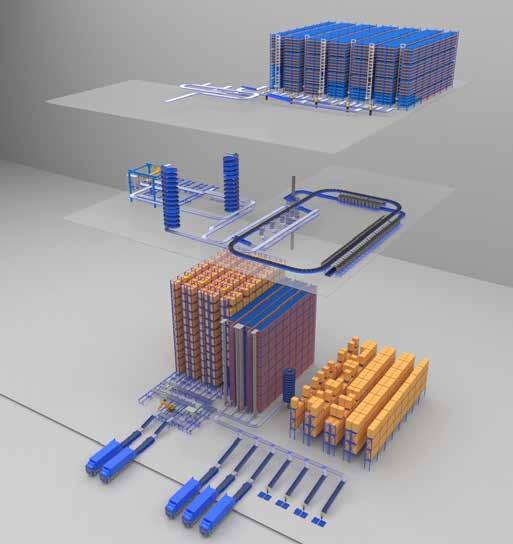
GSC: Can you share some of CIMC Tianda Intralogistics’s future industry trends?
AS: We foresee continued growth in automation, with robotics and AI becoming even more integrated into daily operations. Digital twins, virtual simulations, and advanced IoT sensors will provide unprecedented real-time insight into logistics networks. Sustainability initiatives—such as green warehousing and energy-efficient transport—will also become central, as the industry prioritises environmental responsibility alongside operational excellence.
GSC: What are some of the benefits of automated warehousing and intelligent tracking?
AS: Automated warehousing increases accuracy, reduces labour costs, and enhances safety by minimising manual handling. Intelligent tracking, powered by IoT and AI, offers end-to-end visibility, enabling proactive issue resolution, inventory optimisation, and improved customer satisfaction. Together, these technologies lead to faster turnaround times and a more resilient supply chain.
GSC: How does CIMC Tianda Intralogistics perceive optimising warehouses with the best automation?
AS: We view warehouse automation and air cargo handling systems as a strategic imperative. By incorporating advanced robotics, automated storage and retrieval systems (AS/RS), and AI-powered management platforms, we create highly flexible and scalable environments. Our approach is tailored to each client’s unique requirements, ensuring optimal throughput, space utilisation, and cost efficiency.
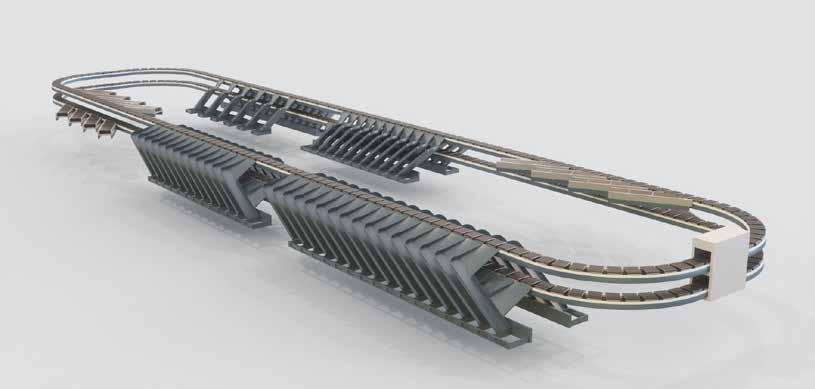
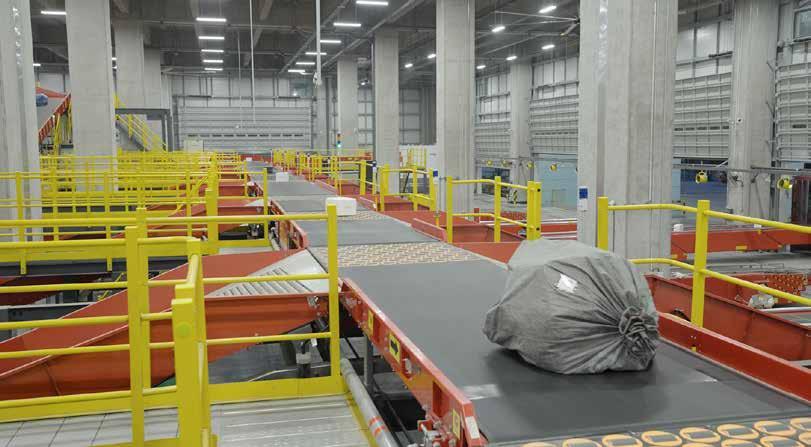
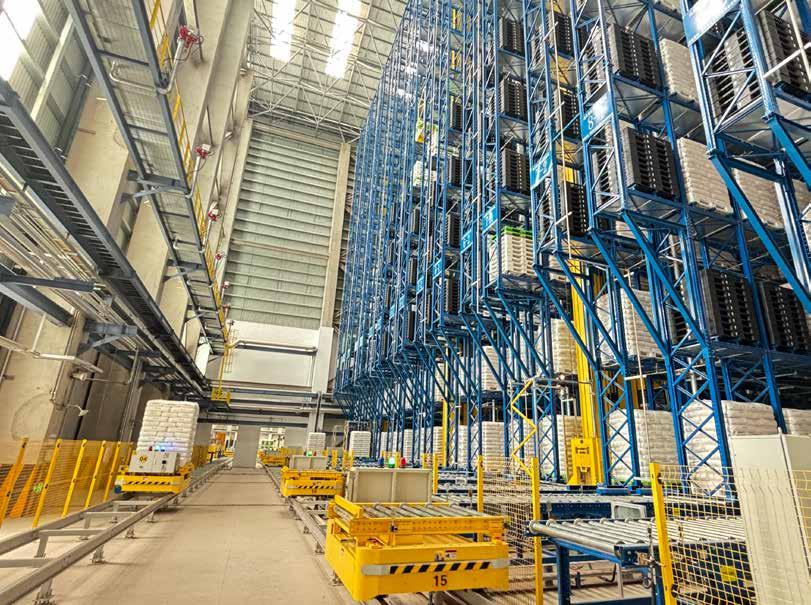
“With advanced robotics, AI-powered platforms, and intelligent storage, we engineer automation that adapts to every industry and every square metre.”
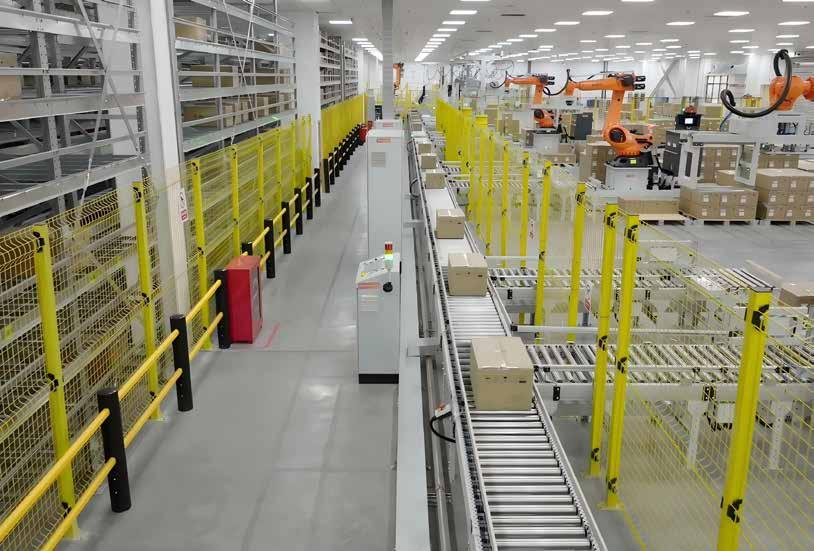
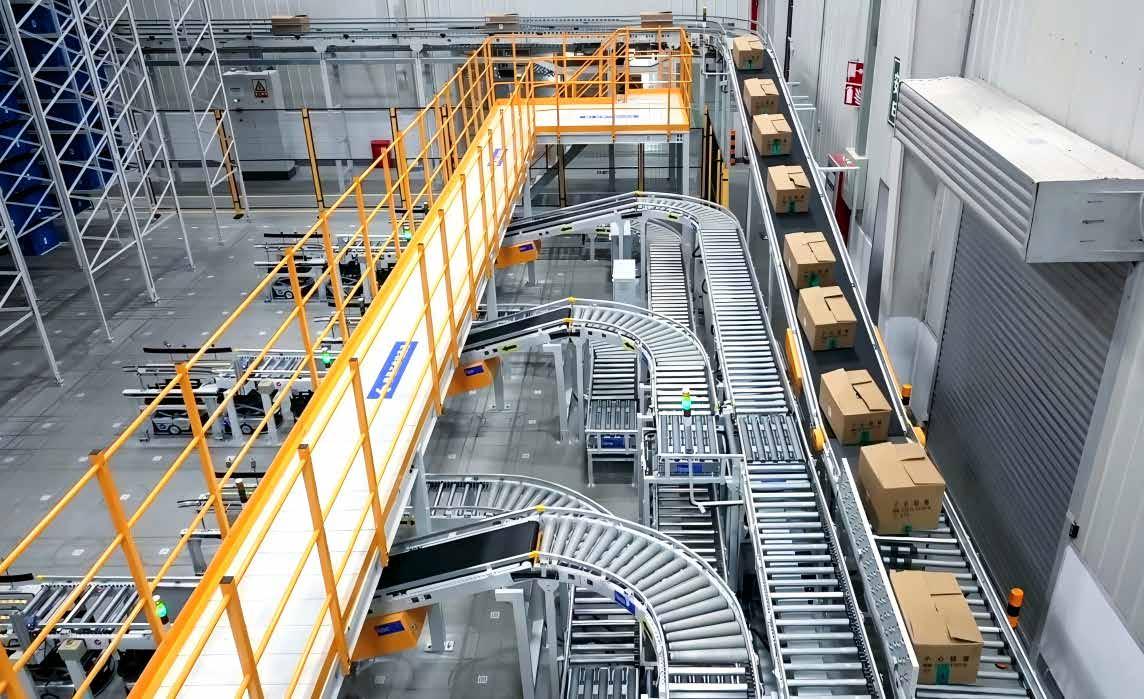
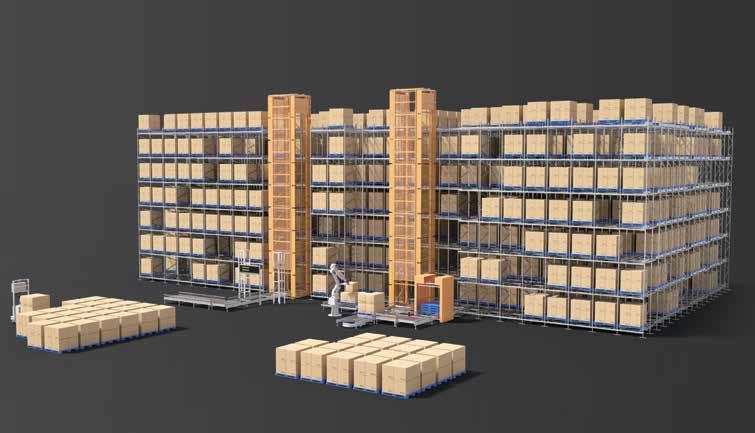
“We believe in a collaborative approach, where AI augments human capabilities rather than replacing them.”
GSC: How can CIMC Tianda Intralogistics help overcome the shortage of space for warehouses especially in the UAE?
AS: The UAE’s logistics sector faces spatial constraints due to rapid growth and regional growth of surrounding competitors in the logistics sector. We aim to address this by working hand-inhand with our customers, designing high capacity and high performing automated solutions that maximise the logistic challenges faced in the country. Modular storage solutions and dynamic slotting algorithms ensure every square metre is used efficiently. Additionally, our systems enable faster goods turnover, reducing the need for excess inventory storage.
GSC: How does CIMC Tianda Intralogistics ensure seamless integration between AI and human workers in automated warehouses?
AS: We believe in a collaborative approach, where AI augments human capabilities rather than replacing them. Our systems are designed for intuitive human-machine interaction, offering user-friendly interfaces and real-time decision support. Comprehensive training and change management programs
ensure our teams are empowered to leverage automation effectively, fostering a culture of continuous improvement.
GSC: What role does predictive analytics play in optimising warehouse operations?
AS: Predictive analytics is at the core of our operational strategy. By analysing historical and real-time data, we can anticipate demand fluctuations, identify maintenance needs, and prevent stockouts or overstocking. This proactive approach minimises downtime, reduces operational costs, and ensures that resources are allocated where they’re needed most.
GSC: How is CIMC Tianda Intralogistics adapting warehouse automation for different industries (e.g., retail, pharmaceuticals, or heavy manufacturing)?
AS: Each industry has unique requirements. For retail, we focus on high-speed order fulfillment and returns management. In pharmaceuticals, our solutions prioritise traceability, regulatory compliance, and climate-controlled storage. For heavy manufacturing, we offer robust systems capable of handling large, heavy components. Our modular platforms allow
for industry-specific customisation, ensuring optimal performance regardless of sector.
GSC: What strategies does CIMC Tianda Intralogistics use to manage data security in IoT-enabled warehouses?
AS: Data security is critical in warehouse management, especially in IoT-enabled environments. ClMC Tianda Intralogistics has developed a comprehensive security framework that protects warehouse data throughout its entire lifecycle, covering data access, transmission, storage, and device security. At the data access layer, role-based access control (RBAC) is fully implemented to restrict unauthorised operations. At the data transmission layer, communication channels are encrypted using protocols such as TLS/SSL and MQTT over TLS to prevent data interception. For data storage, AES encryption ensures data integrity and protection against tampering, while data minimisation principles and anonymisation/desensitisation techniques are applied to protect sensitive information. Additionally, at the device security level, a secure OTA firmware update mechanism is in place to automatically patch vulnerabilities and verify firmware integrity. Security modules are also embedded at the hardware level to defend against physical attacks.
The 7 best material-handling companies for modern supply chains
Even if your throughput return on investment and lead times are great, there is always room for improvement. Material-handling systems suppliers can help companies optimise, regardless of whether they need spare parts or a system rebuild.
If you want the best results, not just any business will do. The best materialhandling companies will use their extensive expertise, cutting-edge technologies and in-depth knowledge to meet a company’s facility-specific needs.
1. Solutions in Action LLC
Solutions in Action is among the best material-handling companies. It specialises in tailored material handling and automation solutions for manufacturing and distribution facilities. A company’s project manager oversees everything from conceptualisation to installation. They even visit sites to tailor products more effectively and ensure a seamless transition.
Its optional multi-phased approach can make the implementation investment more digestible and reduce disruption to daily operations.
Whether you need spare parts, preventive maintenance or a multimillion-dollar machine, SIA can help. It can integrate new equipment into existing systems or refurbish old machines, even if other vendors made them. Even though every solution is custom-built, it combines indepth industry knowledge and experienced technicians to minimise downtime.
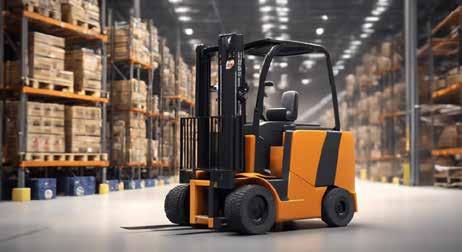
2. Material Handling & Storage Inc.
The family-owned and operated firm Material Handling & Storage primarily serves the West and Southwest United States, with branches in California and Arizona. Its core services include facility design, consulting and equipment installation for warehouses, manufacturers and distributors.
It can provide high-density shelving, structural mezzanines, in-plant modular offices and automated storage solutions. Its turnkey process involves permit submission and structural engineering, freeing up
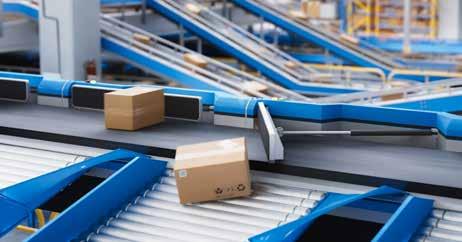
your time. The team analyses a company’s operations before implementation to address business-specific material-handling inefficiencies.
3. Daifuku Co.
Japan-based Daifuku is a global materialhandling equipment supplier with over 11,000 employees. Its core services include consulting, engineering, design, production, installation and post-sales support for automated storage, transport, sorting, picking and control systems. It primarily serves automakers, warehouses, electronics manufacturers and distributors.
Like its competitors, it offers custom solutions. For instance, it can tailor its sorting and picking systems for your load profile and shipping frequency. In addition to hardware, it can create, integrate, and service information and communications technology and warehouse management software.
4. Dematic
Dematic can replace, rebuild or modernise existing machinery to increase uptime. It specialises in transport, storage, picking and shipping hardware. Its services can extend
to training and troubleshooting technical issues if additional help is required — its life cycle support framework provides longterm assistance.
Since it has over 100,000 replacement parts from original equipment manufacturers, one does not have to worry about products being on back order.
There are three service tiers. The first includes 24/7 remote support, basic training and discounted field assistance at a fixed price. Tier 2 offers a guaranteed 98% uptime, on-site maintenance, and continuous diagnostics and mitigation. The third and final one has all of those features, plus parts discounts and an extended warranty at a fixed cost based on throughput.
5. U.S. Materials Handling Corp.
In around seven decades, U.S. Materials Handling grew from a two-person office into a multimillion-dollar corporation. Its large selection of new and used equipment includes scissor lifts, cranes, floor scrubbers, people movers and forklift trucks for purchase and rent. Since it is an authorized HELI dealer, it carries models in all classes. Its spare parts inventory covers materialhandling equipment of all makes and models, ranging from attachments to filters. The team will help customers locate specific components quickly, minimising downtime. If a more hands-on approach is preferred, the service department provides on-site repairs, planned maintenance and technical assistance.
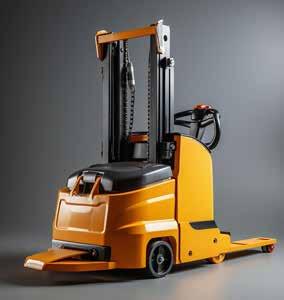
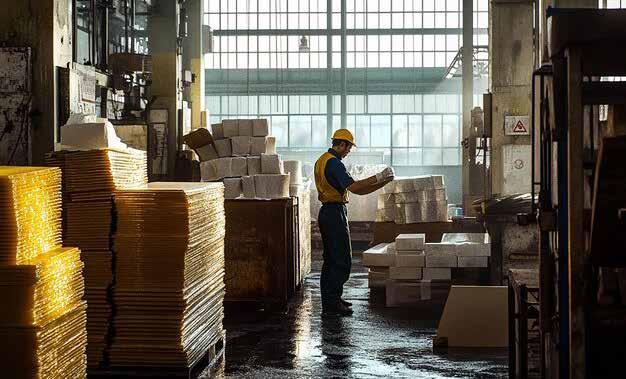
6. Swisslog
Established in 1900, Swisslog has amassed over 3,000 employees who have completed 2,500 projects worldwide. It provides comprehensive project support from conceptualisation to realisation, developing a strategy based on a client’s needs. Its material handling services cover consulting, implementation and ongoing technical support.
Its retail industry expertise covers apparel, general merchandise, e-commerce, grocery, and food and beverage.
In addition to an inventory of 120,000 replacement parts, it offers custom design services for transport, storage and picking. This includes pallets, palletizers, shuttles, robots and software. Whether you need to modernize a machine or enhance equipment efficiency, you can rely on its range of managed services.
7. Bastian solutions
Bastian Solutions has grown from a small Midwest business into a global corporation with 20 offices in the U.S. and multiple abroad. Its specialty is material-handling equipment — both simple and highly automated systems. However, it also offers warehouse design, hands-on training and dedicated support services.
The material handling and software customer support teams are available around the clock. Prompt feedback helps decrease unplanned downtime.
Independent consultants and engineers will guide customers through the consultation, design and implementation processes to make sure their voice is heard. They travel to one’s facility to ensure their plan aligns with their operations, optimising where they can. Material-handling support includes spare parts, warranty replacements and preventive maintenance.
Why are these material-handling companies the best?
Modern supply chains must move fast to outpace demand fluctuations and delays. These seven companies were selected because they can match your pace. They have extensive parts inventories and vast manufacturing facilities, providing unparalleled lead times. Several on this list have a global reach, enabling them to maintain sourcing flexibility in unprecedented times.
Any business in this industry can provide spare parts and sell storage automation solutions, but only a handful have impressive portfolios and are equipped to meet one’s every need.
Those who conduct on-site visits to tailor their products to your floor plan and budget constraints are forward thinkers. The more their material-handling machines align with your facility-specific needs, the faster one’s supply chain moves. They reduce downtime further by troubleshooting technical issues, conducting preventive maintenance and supplying replacement parts.
Choosing between material-handling systems suppliers
Selecting the best material-handling companies comes down to service offerings. Pick the firm that aligns best with your needs — those providing tailored solutions are ideal. One should also consider pricing and location, which can impact budgets and lead times.
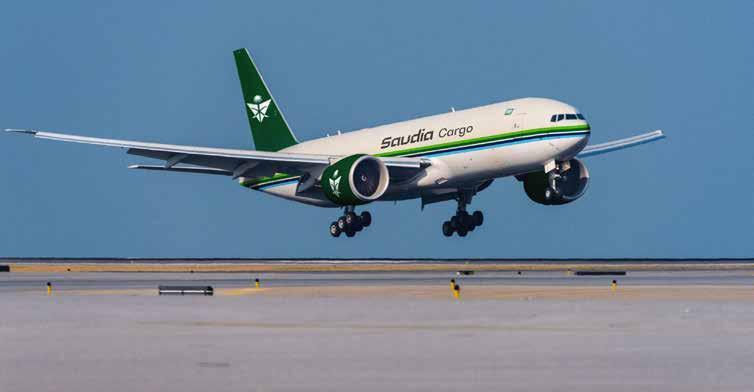
Saudia Cargo and ASL Aviation Holdings bolster global logistics with two A330-300 freighters
Saudia Cargo, a leading global cargo carrier, announced the addition of an Airbus A330-300P2F cargo aircraft, MSN 1272, to their fleet under a wet lease agreement with ASL Aviation Holdings, a global aviation services company. This strategic expansion underscores both companies’ commitment to strengthening global air cargo capabilities and connectivity.
The aircraft arrived at Shannon Airport (SNN) in mid-June following P2F conversion, where it was painted in the Saudia cargo livery. Formerly registered as N810CM the aircraft will operate for ASL Airlines Ireland as EI-LKD.
This is the first of two aircraft under this wet lease agreement. The initial A330300P2F is expected to begin service with ASL Airlines Ireland in September 2025 before being delivered to Saudia Cargo in the fourth quarter. The second aircraft is also scheduled to arrive in Q4. This ACMI (Aircraft, Crew, Maintenance, and Insurance) lease agreement includes comprehensive operational support, such as dedicated crews, a robust maintenance program, and insurance.
The introduction of this aircraft marks the return of the A330F type to ASL Airlines Ireland’s operated fleet. The aircraft will join the airline’s global fleet, providing air cargo services on an extensive network of more than 50 regular destinations across Europe, North America, and Asia, supported by a fleet of 40 aircraft.
The A330-300P2F will complement ASL Airlines Ireland’s existing fleet of B737 and ATR72 freighters, offering cost-efficient new opportunities to air cargo customers in
global markets. With its capability to move both express parcels and larger cargo, the aircraft can cover distances of up to 6,850 kilometers (3,700 nautical miles) and carry up to 62 tonnes (115,808 pounds) of revenue payload, with 26 pallets available on the main deck and a further 11 pallets (32 LD3) available in the lower hold.
Eng.Loay Mashabi, CEO and Managing Director of Saudia Cargo, said: “Expanding our capacity and global reach is a strategic imperative for Saudia Cargo, ensuring uninterrupted supply chains for our customers. The integration of this A330300P2F, in partnership with ASL Aviation Holdings, will significantly support our network capabilities, enabling us to connect markets with greater agility and efficiency. This pivotal addition directly supports our vision to solidify our position as a leading global air cargo carrier and solidifies the Kingdom’s role as a global logistics hub.”
Dave Andrew, Chief Executive of ASL Aviation Holdings, added, “We are delighted to partner with Saudia Cargo to welcome an A330-300P2F to the ASL fleet. This partnership is a positive statement for ASL as we continue to strengthen and grow. The new A330300P2F aircraft is ideal for Saudia Cargo’s express shipping and e-commerce services, providing a flexible solution to meet the diverse shipping needs of its customers and deliver reliable, high-quality cargo services.”
Saudia Cargo stands as a leading national cargo carrier, headquartered in the Kingdom of Saudi Arabia. Leveraging the strategic advantage of the country’s location, it serves as a highly efficient aerial bridge connecting the East and the West, seamlessly bridging
continents. Its extensive reach encompasses approximately 100 airport destinations and 250 customer destinations across four continents, establishing us as a pivotal player in the global air cargo industry.
With a legacy spanning over seven decades and a commitment to a ‘humanfirst’ approach, Saudia Cargo has consistently upheld its esteemed reputation as one of the world’s most dynamic cargo carriers.
ASL Aviation Holdings, a global aviation services company with five airlines is based in Europe and Australia and three associate and joint-venture airlines in South Africa and Asia. ASL is a world leader in ACMI airline operations, and both scheduled and charter cargo and passenger services.
Headquartered in Dublin, Ireland, ASL’s airlines include ASL Airlines Ireland, ASL Airlines Belgium, ASL Airlines France and ASL Airlines United Kingdom in Europe and ASL Airlines Australia, formerly known as Pionair.
ASL also has an associate low-cost passenger airline, FlySafair, in South Africa and joint venture cargo airlines K-Mile Asia in Thailand and Quikjet Airlines in India.
ASL Aviation Holdings airlines operate cargo services for the world’s leading express parcel integrators and eCommerce retailers. Group airlines also operate scheduled and charter cargo and services under its own airline brands on domestic, international, and intercontinental routes in Europe, Asia, the Middle East, North America and Africa.
ASL has a global team of 3,000 people of 51 nationalities. The Group has a fleet of 150 aircraft that includes seven aircraft types ranging from the turbo-prop ATR 72 to the Boeing 747.
Emirates SkyCargo becomes first regional airline to partner with PayCargo, bringing digital payment solutions to the UAE
PayCargo, a trusted logistics payment platform, has officially launched in the United Arab Emirates, with Emirates SkyCargo, the first carrier in the region to adopt PayCargo’s solution. This new collaboration simplifies the cargo payment process, providing customers with a seamless, efficient, and digital payment solution.
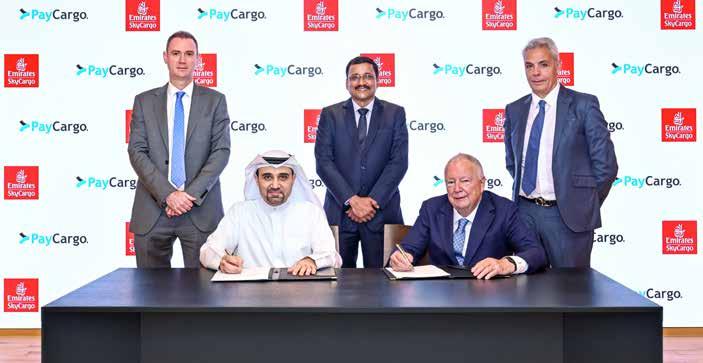
PayCargo offers an online payment solution that connects carriers with freight forwarders and vendors on a single platform. The launch in the UAE marks a shift in the cargo industry, which still relies on traditional and often inefficient payment systems, including cash transactions. Through the integration with PayCargo, Emirates SkyCargo customers in the UAE can now make instant payments via credit card or direct debit, ensuring same-day or nextbusiness-day cargo release, underscoring the airline’s commitment to implementing digital solutions that improve operational efficiency and enhance customer service.
Badr Abbas, Divisional Senior Vice President, Emirates SkyCargo, said, “The next era of logistics, and of Emirates SkyCargo,
will be defined by smart technology and digital solutions. This partnership with PayCargo ensures we are at the forefront of that evolution, providing faster and more secure transactions for our customers, streamlining processes for our internal teams, and solving industry-wide challenges of accessing air freight capacity.”
Eduardo Del Riego, President and CEO of PayCargo, said, “We’re thrilled to launch in the UAE with Emirates SkyCargo as our first regional partner. This solution will help streamline the cargo payment process and save customers valuable time. By eliminating manual payment systems, we can provide a more efficient and reliable solution. We look forward to our continued collaboration with Emirates SkyCargo as they lead the way in digital solutions for the logistics industry.”
The collaboration follows a strategic alliance formed in 2022 between PayCargo and Seed Group, a company of the Private Office of Sheikh Saeed bin Ahmed Al Maktoum. Seed Group played a key role in introducing PayCargo to the UAE market and supporting its expansion in the Middle East and North Africa. Already a central hub of trade, the UAE has strategically invested in multi-modal infrastructure, digital and technology acceleration, and forwardlooking policies to cement its role as a leading global logistics hub. The launch of PayCargo in the UAE, with the world’s largest international airline as a partner, will lay the foundation for increased resilience in logistics, underpinned by world-class digital infrastructure.
In partnership with EKSC, PayCargo expands to the UAE.
ASMO launches procurement services and begins operations at second warehouse in Saudi Arabia
● Strengthening national supply chain capability through integrated procurement and logistics operations
● Advancing a scalable supply chain model aligned with Aramco’s priorities and Vision 2030

ASMO, a joint venture between Saudi Aramco Development Company and DHL, has commenced its procurement services for general supply materials, issuing its first purchase orders for Aramco in July, 2025, and launching warehousing operations at its second site in Saudi Arabia: the Jazan warehouse. These milestones are part of ASMO’s phased national rollout under its 15-year strategic agreement with its anchor customer, Aramco, and support Saudi Arabia’s Vision 2030 agenda by localising supply chains and strengthening the Kingdom’s logistics infrastructure.
“With the start of procurement services for general supply materials and the transition of Jazan warehousing operations to ASMO, we’re laying the foundation for a new era to transform and revolutionise supply chains, not only for Aramco but also for the Kingdom and broader region,” said Sulaiman M. Al Rubaian, SVP of Procurement & Supply Chain Management at Aramco. “It’s early days, but the momentum reflects the dedication of our joint teams and the strength of our shared vision with ASMO. ASMO aims to bring greater control, visibility, and responsiveness to our supply chain, and strengthen our ability to plan, source, and operate more efficiently. As ASMO continues to scale, it intends to play a key role in
supporting our operational priorities and national supply chain goals.”
Phased approach
ASMO is adopting a phased approach to its procurement rollout, extending through 2027 and aligned with customer operations. It begins with General Supply, followed by MRO, Drilling & Chemicals, and Projects materials. This structured approach ensures scalability and supports evolving operational priorities across the supply chain.
In parallel, ASMO has begun operating the Jazan warehouse, an Aramco owned facility, located within the Jazan Refinery Complex. Now under ASMO management, the facility supports Aramco downstream, fire protection, distribution, and terminal operations. The transition is aimed to strengthen supply chain resilience, enhance operational efficiency, and improve responsiveness to customer demand of critical MRO inventory items.
“Delivering on procurement and logistics for Aramco is a responsibility we approach with focus and intent,” said Craig Roberts, CEO of ASMO. “These are foundational steps, building trust, generating measurable value, and setting the stage to scale an integrated supply chain model across the Kingdom. This progress reflects the dedication of our growing team and the strong coordination
with Aramco through the ASMO Transition & Oversight team, whose structured approach has been key to a successful rollout.”
ASMO’s model is designed to integrate procurement, warehousing, inventory management, and logistics into a unified digital platform. While currently being rolled out in phases, this system will ultimately improve visibility, simplify decision-making, and unlock economies of scale. Built to serve Aramco and a broader base of industrial customers, including in energy, chemicals, healthcare, and aviation, it also supports localization, supplier development and broader national goals.
Since the announcement of its establishment in 2024, ASMO has signed 26 MoUs with strategic partners, launched operations in Riyadh and Jazan, and commenced procurement services for general supply materials. Early development efforts are also underway for future facilities in SPARK, Jubail, and Yanbu, alongside plans to scale its digital procurement platform into a full B2B e-marketplace.
Looking ahead, ASMO aims to operate more than 8 million square meters of warehousing, manage over 500,000 inventory items, and oversee procurement activity valued at over USD 8 billion by 2030, positioning both ASMO and Saudi Arabia at the centre of a modern, resilient, and globally competitive supply chain network.
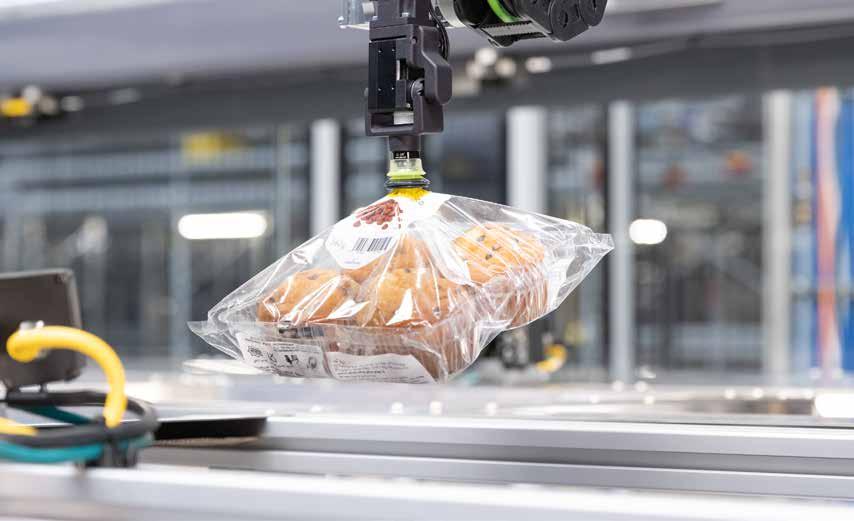
Picking small parts manually is a time consuming process — but a smart picking robot changes that.
Make that perfect pick every time with SSI Piece Picking. A solution that delivers accuracy and consistency, even with delicate pharmaceutical products and luxury cosmetics and fragrances.
Automate your picking process today.
LEARN MORE
Enhance Your Picking Efficiency
> 99% picking accuracy
Increased throughput and efficiency
Seamless WMS integration
Scalable for peak demands
Optimize labor costs and resourcing

GWC and Qatar Airways extend partnership with a landmark logistics agreement
In a major milestone for Qatar’s aviation and logistics sectors, GWC and Qatar Airways has officially renewed their long-standing partnership through the signing of a five-year service agreement. The highprofile signing ceremony, held in Doha, underscores both organisations’ shared commitment to operational excellence, innovation, and delivering world-class standards on a global scale.
As one of the world’s most awarded and respected airlines, Qatar Airways consistently sets the benchmark for aviation excellence. Known for its unwavering commitment to service, safety, and innovation, the airline has earned multiple “Airline of the Year” accolades and continues to expand its global footprint from its hub at the world-class Hamad International Airport.
For over a decade, GWC has proudly served as the logistics service provider for this prestigious airline and its key affiliates – including MATAR, and Qatar Duty Free. The airline’s success on the global stage is powered not only by its premium passenger experience, but also by the seamless, behind-the-scenes logistics operations that enable it to thrive.
GWC Group Managing Director, H.E. Sheikh Abdulla Bin Fahad Bin Jassim Bin Jabor Al Thani, said: “This renewed agreement with Qatar Airways reflects the strength of Qatar national institutions working together to achieve excellence on a global stage. At GWC, we are proud to support the operations of the World’s Best
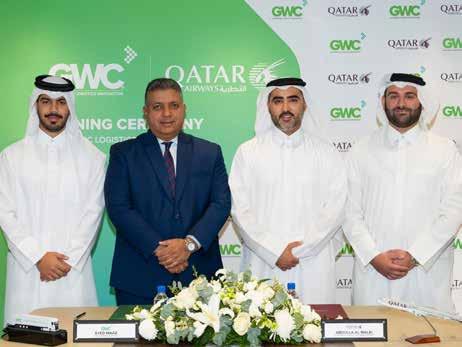
Airline with world-class logistics solutions rooted in innovation, efficiency, and reliability. Our long-standing partnership with Qatar Airways is a testament to our shared values and our unwavering commitment to Qatar’s continued progress and global connectivity.”
Qatar Airways Group Chief Executive Officer, Engr. Badr Mohammed Al-Meer, said: “We are pleased to renew our long-standing partnership with GWC. This agreement strengthens our operational capabilities and supports our continued global growth. By working together, we remain committed to delivering world-class services across a broad range of functions, guided by our shared pursuit of excellence.”
A logistics landmark
GWC stands at the forefront of Qatar’s logistics industry, delivering integrated, end-to-end supply chain solutions across diverse sectors including aviation, oil and gas, healthcare, retail, and e-commerce. As the Official Logistics Provider for the FIFA World Cup Qatar 2022™, GWC has consistently demonstrated world-class
execution, innovation, and scale. With a robust infrastructure network, a reputation for operational excellence, and a deep commitment to supporting Qatar’s National Vision, GWC continues to be the logistics partner of choice for many of the world’s most respected institutions.
GWC Chief Commercial Officer, Syed Maaz, said: “This partnership reflects the very best of Qatari ambition and capability. To serve a world-renowned airline like Qatar Airways is a responsibility we take immense pride in. This renewed agreement is not only an extension of services – it’s a renewed promise to uphold the gold standard of logistics that supports a globally admired aviation brand, every day.”
Under the newly signed agreement, GWC will continue delivering a full spectrum of integrated logistics services including import/export handling, customs clearance, warehousing and distribution, inventory management, document storage, and other value-added solutions. These services will ensure seamless, end-to-end support for Qatar Airways’ operations on the ground, mirroring its excellence in the skies.

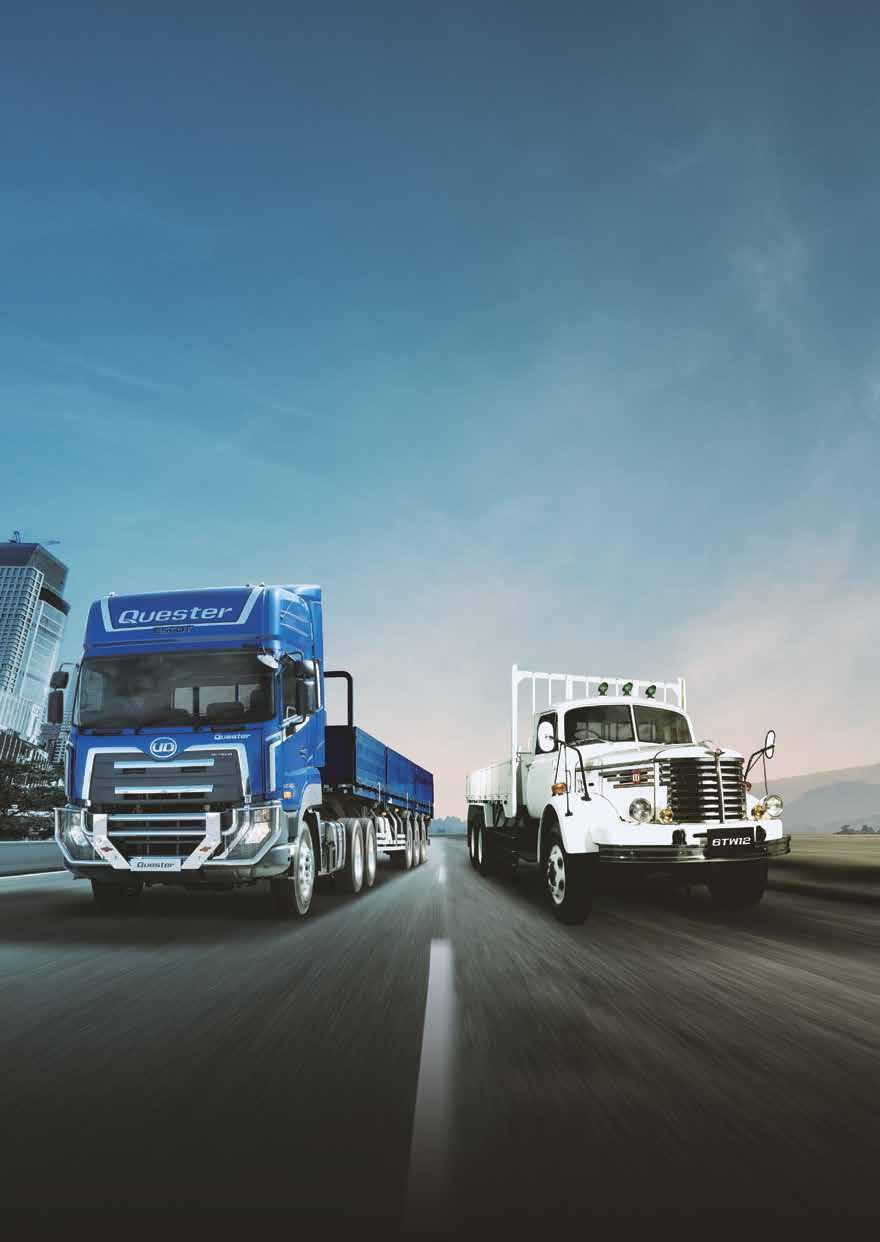
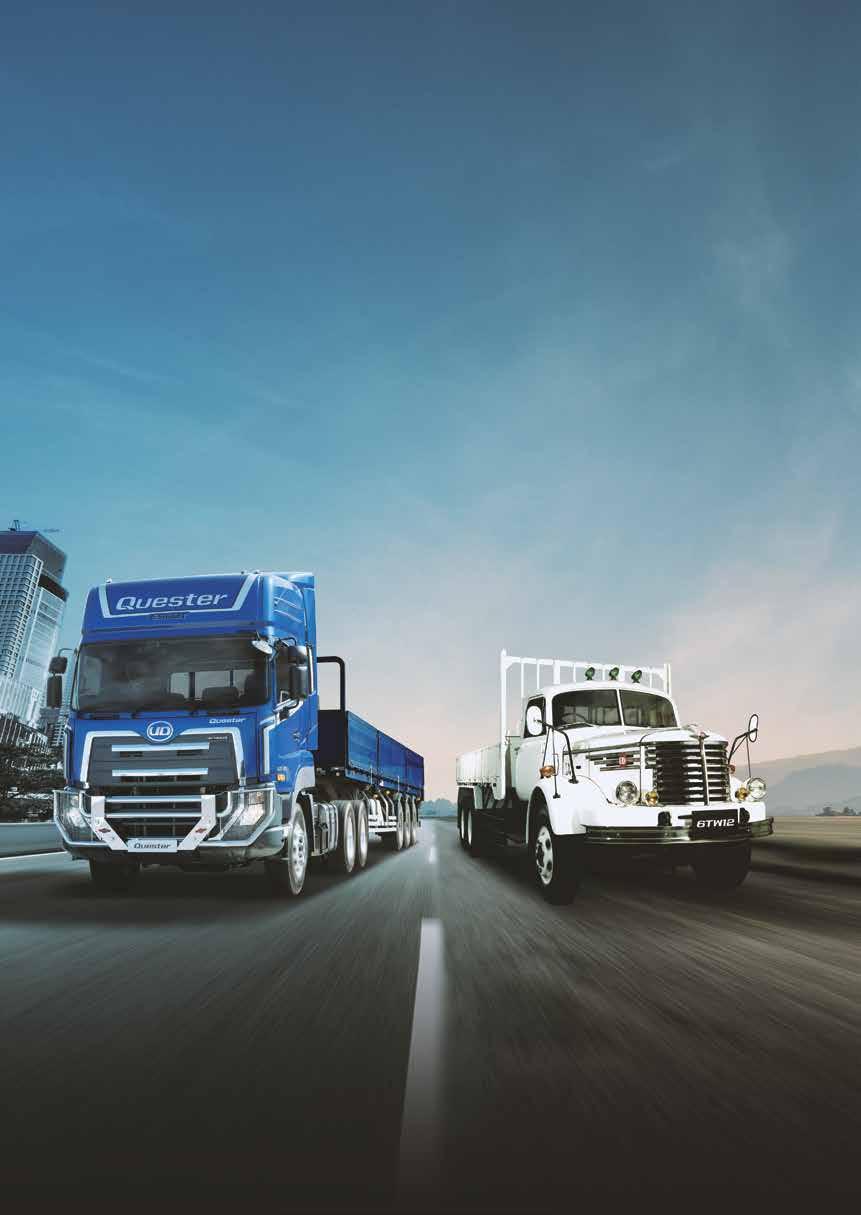

DHL deploys 1,000+ additional robots across UK operations to support e-commerce growth and life sciences health care sector
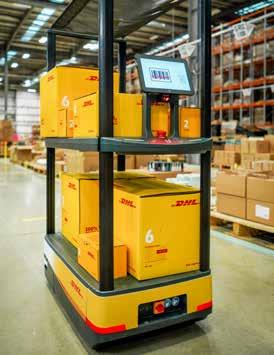
● Investment aligns with DHL Group’s Strategy 2030, reinforcing the UK’s pivotal role in resilient global trade and cross-border logistics
● Announcement comes as UK launches new Trade Strategy to boost competitiveness and global market access for British businesses
● Company leads innovation with first deployment of Boston Dynamics’ Stretch Robots in the UK
By Abigail Mathias
DHL Supply Chain recently announced the investment of £550m (Dhs 2,724m) to expand its infrastructure and accelerate the rollout of automation across its customer operations in UK and Ireland (UK and I), to support growing demand in the e-commerce and life sciences health care sectors.
The new investment builds on the €1bn already spent on automation by DHL Supply Chain over the last three years, with more than 3,200 digitalisation projects deployed across the UK & Ireland and EMEA. Until 2030, DHL’s contract logistics business plans
to significantly increase its scale in UK&I as well as globally, with automation, robotics and digitalisation being a key enabler of this growth.
Saul Resnick, CEO DHL Supply Chain UK & Ireland says, “Our investment reflects the growing opportunities across the UK market. Customers are increasingly recognising the benefits of digitalisation and, to date this year, we’ve already surpassed the number of deployments achieved last year. What’s more, the integration of robotics and automation in customer operations is becoming more
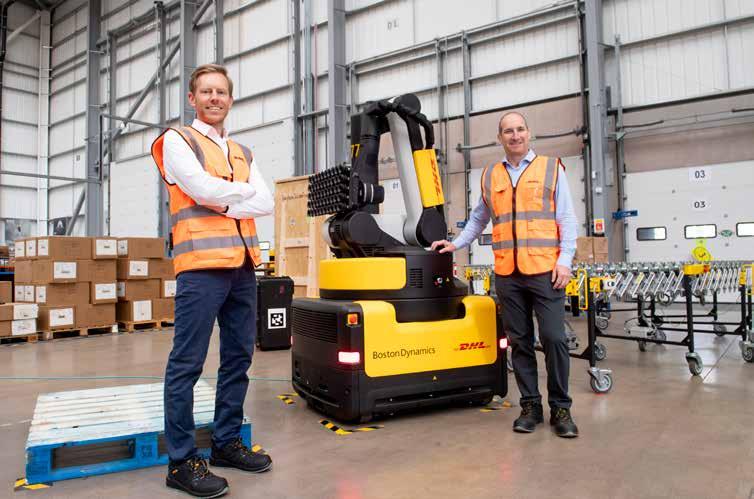
sophisticated, so customers are seeing greater benefits and faster ROI.
“This momentum is only possible with the right infrastructure and expertise in place, tailored to support high-growth industries like e-commerce and healthcare. That’s why we’re investing for long-term impact, ensuring we are the go-to supply chain provider. The UK’s new Trade Strategy reinforces this direction by supporting fast-growing sectors and enhancing access to global markets –priorities that closely align with our investment focus and customer needs.”
Through strategic partnerships with technology companies, DHL is intensifying its commitment to go beyond classical vendor relationships to emphasise codeveloping, testing, and scaling robotics solutions with leading innovators. This strategy has already resulted in more than 2,000 robots working collaboratively alongside its associates in the UK, Ireland and EMEA region. More than 750 Assisted Picking Robots from its strategic partners Locus Robotics and 6 River Systems are live across 18 sites in the region and DHL recently deployed the first Boston Dynamics Stretch Robot for container unloading in the UK.
Global Supply Chain was invited to witness operations. The Stretch robots have the ability to unload up to 700 boxes per hour, significantly reducing physical strain on warehouse colleagues and enhancing productivity in fast turnaround environments such as e-commerce. With a 16-hour battery life, the robots need only an hour to charge, there by increasing efficiency.
Health Logistics facility
Further supporting DHL Group’s Strategy 2030, DHL will open a new DHL Health Logistics facility in Derby. The facility has been designed to support growth in the life sciences and healthcare sector, which is projected to experience double digit growth in the UK over the next five years, driving demand for specialist logistics capabilities. Each site will feature cold chain and cleanroom facilities and will play a pivotal role in the wider DHL Health Logistics network, globally.
The investment plan reinforces the role of the UK as one of DHL Supply Chain’s largest and most strategically significant regions. With long-standing trade and supply chain expertise, the UK has proven to be a resilient and adaptable logistics hub and plays a key role in global commerce as trade patterns continue to shift.
The announcement comes as the UK Government sets out its first Trade Strategy since leaving the EU – a timely backdrop that reflects a shared emphasis on strengthening global trade networks and supporting high-growth sectors,
while aiming to unlock £5billion in new opportunities for British businesses. As the UK looks to strengthen its position as a global trade leader, DHL’s continued investment in automation and infrastructure in the UK and Ireland aligns with the strategy’s focus on high-growth sectors and resilient, future-ready supply chains.
Tim Tetzlaff, Global Head of Digital Transformation, DHL Supply Chain, says, “At DHL, we’re driving the next wave of automation, not as a one-size-fits-all approach but as a set of intelligent, adaptive technologies tailored to the specific needs of individual sectors. For e-commerce, for example, where the market is evolving and demand is growing, we’re expanding our fulfilment capabilities to support that shift with automated solutions that significantly simplify high-volume operations. Meanwhile, in the growing life sciences sector, we’re leveraging automation to respond faster to demand and manage complexity at scale with end-to-end visibility, amid a larger focus on patientcentric approaches and differentiated routes to market.”
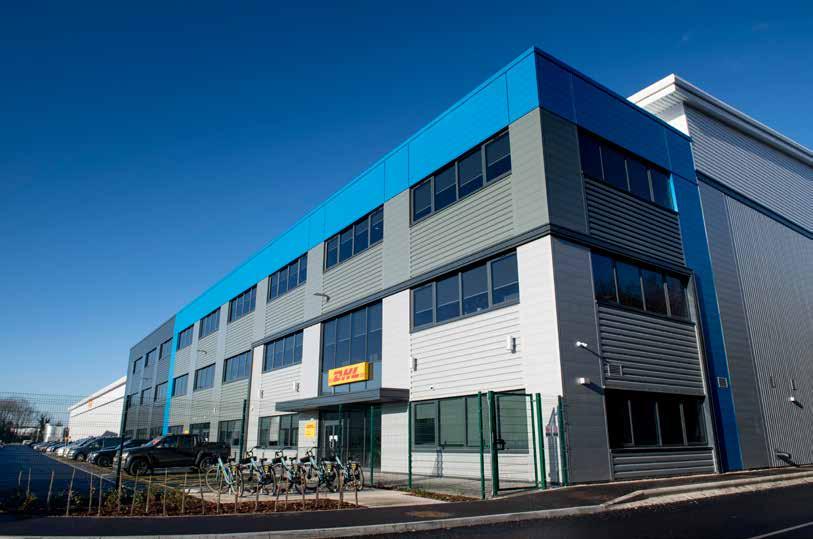
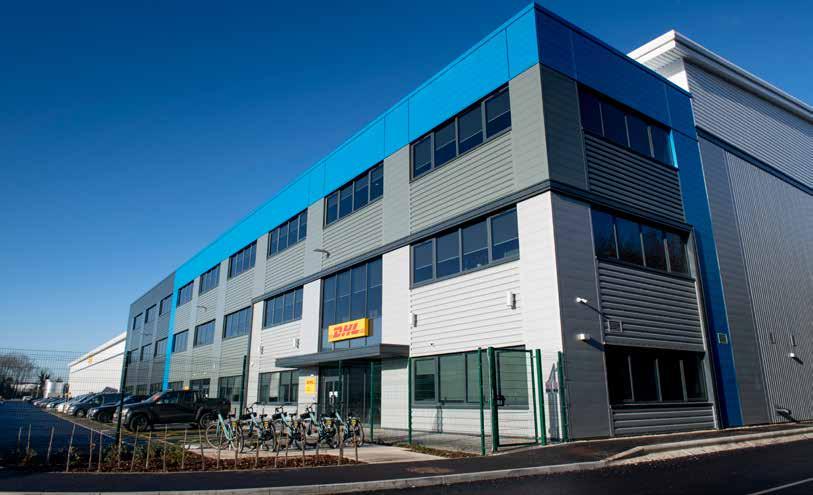
DHL spotlights top AI and social media trends in the UAE
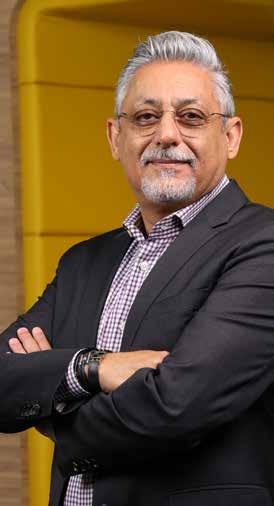
The
DHL
E-Commerce Trends Report 2025
The E-Commerce Trends Report 2025 surveyed 24,000 consumers from Europe, the Americas, AsiaPacific, Africa, and the Middle East. Its findings offer actionable insights for e-commerce brands seeking to meet changing expectations, personalize experiences, and create growth through smarter logistics and innovation.
● 96% of UAE consumers expect to shop primarily through social media by 2030, bypassing traditional websites entirely
● 89% want AI-driven shopping tools — from virtual try-ons to voice search — to guide their decisions
Social commerce is rapidly becoming the new e-commerce as a vast majority of UAE consumers (86%) say they have already made a purchase via social media, and 96% expect these platforms to become their primary shopping destination by 2030. This is according to the findings of DHL’s E-Commerce Trends Report 2025, which draws on insights from 24,000 online shoppers across 24 key global markets, including the UAE.
The report underscores how the traditional e-commerce website is increasingly being replaced — or bypassed — by social platforms as consumers are turning to apps like TikTok, Instagram, and Facebook not just for discovery, but for purchase. The power of influence also plays a critical role, as 93% of shoppers in the UAE say viral trends and social buzz influence their buying decisions. Facebook and Instagram, in particular, are driving change in the UAE, where 69% and 68% of online shoppers report buying through the app. This shift signals a major transformation in how and where brands need to engage with their audiences, and calls for seamless, mobile-native experiences built for in-app conversion.
“Our E-Commerce Trends Report underscores how UAE shoppers are becoming far more discerning as they increasingly rely on devices to make purchases. To succeed in today’s competitive e-commerce market, online retailers need to understand how they can attract a diverse mix of shoppers and turn these browsers into repeat buyers. The rise of the environmentally-conscious shopper also marks a transformational shift in buying behavior – one that retailers should not take lightly,” states Samer Kaissi, CEO of Gulf Cluster and UAE Country Manager at DHL Global Forwarding Middle East and Africa. Delivery remains the No. 1 conversion
killer and the biggest drivers of cart abandonment, with 84% of consumers in the UAE saying they would abandon their purchase if their preferred delivery option is not available. Just as critically, 85% will leave if the return process doesn’t match their expectations. Trust also plays a major role, with 67% of shoppers in the UAE reporting that they will not buy from a retailer if they don’t trust the delivery and returns provider. A vast majority (82%) also now consider sustainability when making online purchases and 42% have actively abandoned their carts due to sustainability concerns. These expectations emphasize the importance of transparent, customercentric logistics strategies — not just as an operational concern, but as a core part of the conversion funnel.
Virtual try-ons
One of the most highly anticipated and demanded innovations among consumers is virtual try-ons, AI-powered shopping assistants, and voice-enabled product search. Shopping via voice commands is already on the rise, with 59% shoppers in the UAE making purchases handsfree. Additionally, 68% of shoppers in the UAE express willingness to participate in recycling or buy-back programs offered by retailers. These behaviors point to a growing expectation that brands will not only reduce their footprint, but actively empower consumers to shop more sustainably. DHL’s insights provide a clear roadmap for retailers aiming to capture the attention of today’s diverse shopper demographics. By embracing technology, prioritizing sustainability, and understanding the evolving preferences of consumers, businesses can transform challenges into opportunities.
Samer Kaissi, CEO of Gulf Cluster and UAE Country Manager at DHL Global Forwarding Middle East and Africa.
JD.com opens new warehouse in the UAE
JAFZA project brings total number of warehouses in the country to six
JD.com, also known as JINGDONG, a technology and service enterprise with supply chain at its core, announced the opening of its new warehouse in Dubai. The official opening took place on August 8 this year. The facility represents JD.com’s first asset investment in the country, made through its infrastructure investment and management platform, JINGDONG Property, and is operated by JINGDONG Logistics.
Text: Located in Dubai’s Jebel Ali Free Zone (JAFZA), the warehouse has a floor area of over 10,000 square meters and brings JINGDONG Logistics’ total number of warehouses in the UAE to six. It adopts a digital operations model, powered by real-time inventory management, optimising performance and traceability. The warehouse, which is already providing storage for nearly 1 million items for a major electronics manufacturer, consistently achieves an outbound ‘in-time’ rate exceeding 99.9%.
JINGDONG Logistics’ supply chain service, JoyLogistics’ solution supports a tailored approach that improves space utility and inventory control, while helping customers manage seasonal fluctuations and categoryspecific complexities more effectively.
JD.com has evolved from a pioneering e-commerce platform into a leading technology and service provider with supply chain at its core. JD.com, Inc.’s business has expanded across retail, technology, logistics, health, property development, industrials, private label, insurance and international business. Ranking 44 on the Fortune Global 500, JD.com, Inc. is China’s largest retailer by revenue.
This new warehouse is the next step of JD.com’s strategy to build its logistics business across the UAE, Saudi Arabia, and Turkey, enhancing inter-market movement and operational synergies. JINGDONG Property is actively scaling its presence in the region, including plans for a 70,000 sqm smart logistics hub in Abu Dhabi in partnership with Abu Dhabi Airports Free Zone (ADAFZ). JoyLogistics offers end-to-end logistics services, integrating
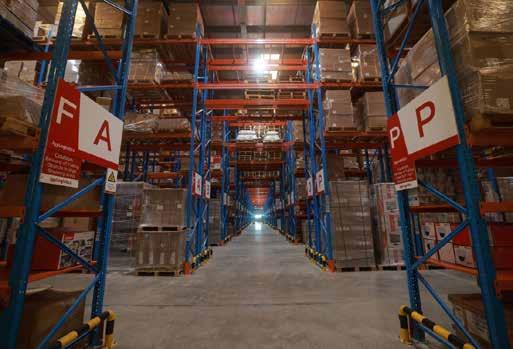
international freight (sea, air, express) with last-mile delivery and bonded warehousing, supporting seamless B2B and B2C operations in the Middle East.
Feng Guo, General Manager of Middle East, JD.com, said: “The investment marks a strategic milestone in our long-term investment and growth in the Middle East, enhancing the existing operational footprint to support greater regional scalability and trade. We are investing not just in physical infrastructure, but in the long-term digital transformation of the region’s logistics landscape, empowering cross-border trade and supply chain transformation.”
Charlie Peng, Head of Middle East at JINGDONG Logistics, said: “JD.com brings nearly two decades of global supply chain experience. We are renowned for speedy, trustworthy and tech-driven solutions, with a strong track record in building smart logistics ecosystems across e-commerce, electronics, FMCG, apparel, and automotive sectors. Dubai’s location at the crossroads of Asia, Africa, and Europe, combined with JAFZA’s status as a tax-free zone, makes our warehouses an ideal choice to
serve multinational corporations seeking to expand or optimise their presence in the Middle East and beyond.”
JD Logistics, is a leading technologydriven supply chain solutions and logistics services provider. JINGDONG Logistics has established six highly synergized logistics networks including warehousing, linehaul transportation, last-mile delivery network, bulky items, cold chain logistics, and cross-border logistics networks. As of December 31, 2024, including cloud warehouses operated by third parties, JINGDONG Logistics manages over 3,600 warehouses, with a total area exceeding 32 million square meters. JINGDONG Logistics has strategically built a Global Smart Supply Chain Network, featuring highly automated warehousing systems and reliable international transportation solutions.
The company currently operates over 100 bonded, direct mail and overseas warehouses, with a total GFA exceeding 1 million square meters, spanning 19 countries and regions worldwide.
“JoyLogistics” and “JoyExpress” are JINGDONG Logistics’ international business brands.
AJEX Logistics Services expands B2C delivery services across Qatar, Oman and Kuwait

AJEX Logistics Services, the Middle East specialist in e-commerce distribution and logistics solutions, has announced the expansion of its B2C Full Mile and Last Mile delivery services to Qatar, Oman, and Kuwait. The company’s ongoing expansion marks the latest milestone in its mission to provide seamless, end-to-end e-commerce logistics across the region.
In response to rising demand, AJEX is now offering a single one-stop-shop for all B2C deliveries across the GCC, providing businesses with convenient, tech-enabled delivery solutions. Customers across the newly added AJEX network in Qatar, Oman, and Kuwait will now benefit from services including cross-border fulfilment, customs clearance, cash-on-delivery (COD), returns, and insurance, tailored to local
The Saudi headquartered logistics company now offers its Full Mile and Last Mile B2C Services across all GCC markets
market needs. Designed to ensure service excellence, all AJEX parcel deliveries are supported by real-time tracking for full visibility and control.
E-commerce adoption continues to accelerate across the Middle East, driven by rising digital connectivity, shifting consumer expectations, and strong investment in both digital and logistics infrastructure. According to recent market research, e-commerce sales are projected to grow approximately 11% annually from 2023 to 2027 across the Gulf region, reaching $49.78 billion by 2027, with emerging markets like Kuwait, Oman, and Qatar, and key sectors such as fashion, groceries, and healthcare, anticipated to be major contributors.
With its latest expansion, AJEX is fast becoming the preferred logistics provider in the Middle East, trusted by businesses for
speed, reliability, and innovation.
“With the expansion of our B2C delivery services into Qatar, Oman, and Kuwait, AJEX is now uniquely positioned to support the entire GCC region with fast, reliable, and customer-centric e-commerce logistics,” said Mohammed Albayati, Group CEO of AJEX Logistics Services. “As online retail continues to reshape consumer habits, we remain committed to building agile and scalable logistics solutions that meet the needs of retailers and customers alike, while supporting national visions for diversification, digital growth, and regional integration.”
This latest expansion underscores strategic role of AJEX in advancing e-commerce enablement across the region—helping businesses grow, consumers connect, and economies thrive through smarter logistics.
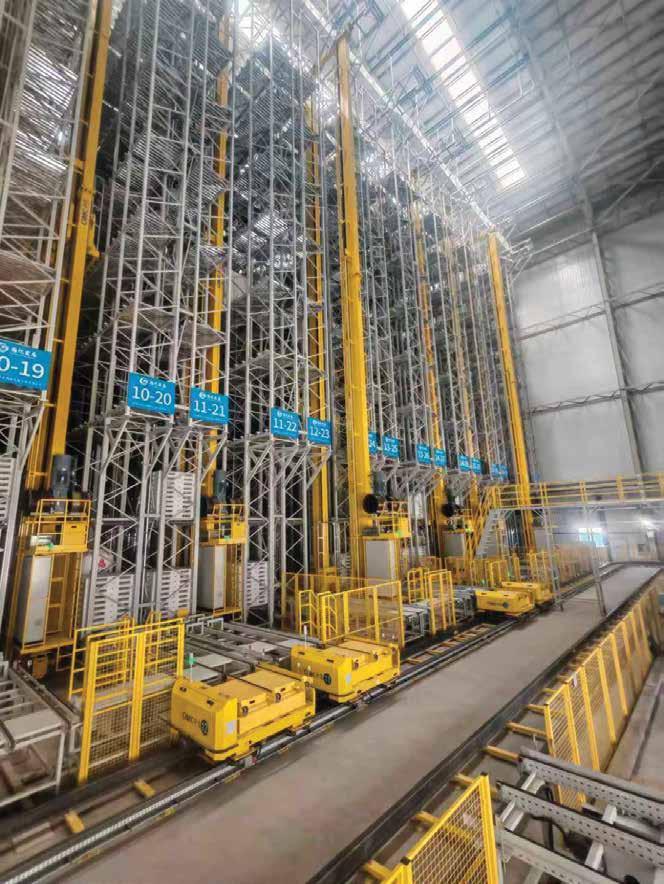
Smarter Logistics, Stronger Future
Founded in 1979 and joining ClMC Group in 2014, we are a proud member of ClMC TlANDA and a global leader in intralogistics and material handling solutions. With 40+years of expertise and 1000+ large-scale projects, we provide customized automation system solutions for industries including 3PL, retail, express, pharmaceuticals, FMCG, petrochemicals, new energy, F&B, cold storage, and CHS.
3 Reasons to Choose CIMC TIANDA Automation Solutions
Seamless Integration: Enhance your warehouse with our automated storage systems and robotic picking solutions.
Advanced Control: Real-time monitoring and predictive analytics to optimize performance.
Scalable Solutions: Adapt to growing demands with flexible, customizable systems.



Aron.Schiller@stas.cimc.com
Linkedin: https://www.linkedin.com/in/aron-schiller/
Dubai Airshow 2025 launches future-facing conference programme to drive global aerospace innovation
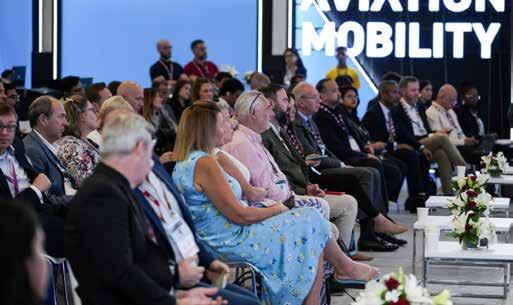
Event to showcase over 350 speakers.
The UAE is gearing up for a reimagined Dubai Airshow. From 17 to 21 November 2025, the world’s most influential aerospace event returns to Dubai Airshow Site (DWC) with a dynamic new conference line-up built to spark ideas, tackle industry shifts, and accelerate progress in aviation, space, and defence.
This year’s programme brings together more than 350 expert voices, delivering over 90 hours of live content across 12 focused tracks. Spread over four interactive stages, the agenda reflects the industry’s changing priorities—looking ahead without losing sight of what matters now.
To meet the pace of transformation, the 2025 edition adds six new tracks covering smarter maintenance and turnaround strategies, digital breakthroughs in airline and airport operations, emerging challenges in cybersecurity, the latest in airport technologies, inclusive workforce development, and a dedicated “Future Flight: Powered by Women” programme, created in collaboration with the International
Aviation Women’s Association (IAWA). Dubai Airshow 2025 isn’t just built for content—it’s built for connection.
This years’ experience goes beyond the stage, with immersive technology demonstrations, high-energy startup pitches, and personal boardroomstyle discussions. The newly launched Academy Stage brings timely, relevant conversations to the heart of the show, while Vista returns to amplify the voices of emerging innovators and disruptors.
Paul Griffiths, CEO of Dubai Airports, said: “Dubai Airshow 2025 will bring together global aviation leaders at a time when our industry is redefining the way people and economies connect. As hosts of the Airport and Airline Keynotes, Dubai Airports is proud to contribute to developing a vision for a future that is built on innovation, sustainability, and new models of global connectivity. This gathering in Dubai provides a platform to chart bold ambitions and forge the partnerships that will help write the next chapter of air travel worldwide.”
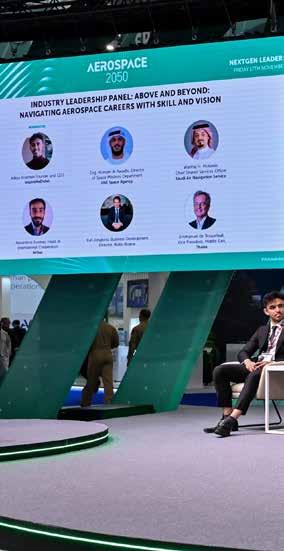
For the first time, Dubai Airports will host the Airport & Airline Keynote Track, spotlighting some of the most influential leaders in global aviation. Attendees can hear from Paul Griffiths, CEO of Dubai Airports; Sir Tim Clark, President of Emirates Airline; Tony Douglas, CEO of Riyadh Air; and others as they share insight on air traffic growth, digital transformation, airport strategies, and new approaches to aviation safety.
Ivan Bassato, Chief Aviation Officer at Aeroporti di Roma, said: “The Dubai Airshow is a premier global stage for aerospace innovation, and we are proud to showcase Aeroporti di Roma’s vision in such an exceptional setting. Recognised internationally for innovation, sustainability, and operational excellence, ADR continues to lead the transformation of the aviation sector. At the heart of our presence will be Advanced Air Mobility (AAM), where our subsidiary UrbanV stands as a global leader in vertiport development. Dubai, a symbol of excellence in both airport infrastructure and airline operations, is
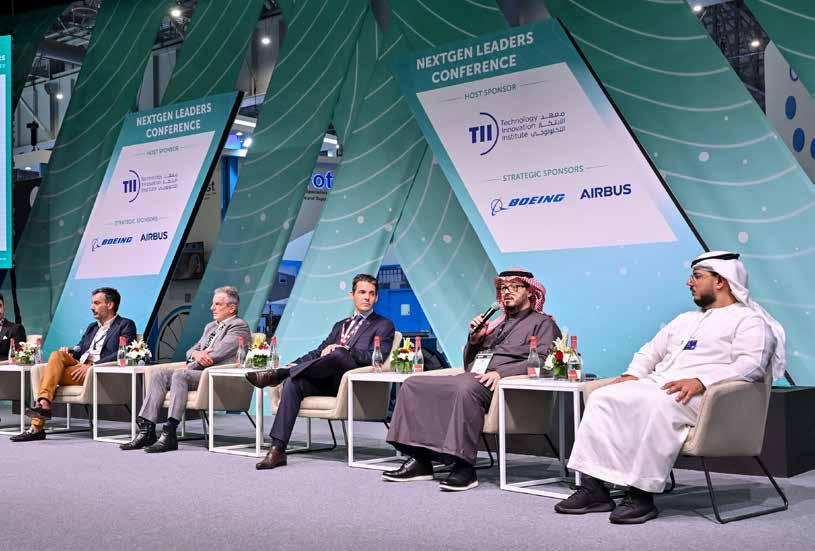
also emerging as a global pioneer in AAM. We are ready to contribute to this revolution, bringing our expertise in safely and efficiently integrating new forms of mobility into the urban airspace.”
The UAE Space Agency returns with a two-day Space conference, this time with a sharper focus on sustainability, security and innovation in orbit. Expect bold conversations on space advancements that’s changing how we live, work and connect - plus fresh opportunities in the growing downstream sector.
Brian Cobb, Chief Innovation Officer at Cincinnati/Northern Kentucky International Airport (CVG), said: “From the heartland of America to the flight paths around the world, Dubai Airshow is a launchpad for partnerships that fuel economic growth and transform global connectivity. We’re honoured to showcase and share CVG’s prowess in evolving passenger experience, advancing airport technologies, leveraging sustainability, and accelerating Advanced Air Mobility. CVG is leaning into the future for lasting economic goodness at global scale.”
Alongside it, a two-day sustainability
track dives into the future of greener skies- from cutting-edge aircraft and cleaner fuels to the policies that support building a net zero future for aviation.
“The Dubai Airshow 2025 conference is a vital platform for ideas and innovations that will define the next decade and beyond of aviation, space and defence,” said Timothy Hawes, Managing Director of Informa Markets. “We are proud to bring together the world’s most influential industry voices to explore the opportunities ahead, and to solidify the UAE’s leading position as a global hub for the aerospace and defence industry.”
The inaugural MRO track goes deep into fresh technology, evolving business models, and growth opportunities— giving attendees practical strategies they can apply right away.
At the Academy Stage, the spotlight turns to vital themes like cyber risk, tech innovation, and workforce inclusivity. The “NextGen Leaders” series opens the floor to students and young professionals ready to shape the next chapter of aerospace.
Advanced Air Mobility (AAM) will
take centre stage, offering a close-up look at the technologies, policies, and partnerships changing how we think about flight. Meanwhile, sessions on Passenger Experience dive into how aviation can better serve travellers— offering smoother journeys, smarter services, and stronger connections.
“The Dubai Airshow is one of the most important global stages for aviation, and Archer is thrilled to take centre stage at such a pivotal moment for our industry,” said Adam Goldstein, Founder and CEO of Archer Aviation. “Building off the flight test program we now have underway in Abu Dhabi, we look forward to flying Midnight at the event and sharing Archer’s latest updates as we continue to showcase our global leadership in shaping the future of mobility with our partners in the UAE.”
Vista, the show’s flagship innovation platform, brings together startup founders, investors, and decision-makers over four energetic days. Expect breakthrough ideas, high-impact pitches, and realtime deal-making—all designed to turn bold thinking into business results.
Noblelift names exclusive dealer for Saudi Arabia
Bakheet Machinery, a material handling equipment distributor, has recently been named as Noblelift Intelligent Equipment’s exclusive dealer for the Kingdom of Saudi Arabia.
Noblelift is a leading global manufacturer and service provider specializing in material handling equipment and logistics solutions.
The company says the dealership agreement is an important step in strengthening the company’s presence in the Saudi market will include internal combustion engine (ICE) forklifts, lithiumpowered solutions and smart technologies for warehouse management. “The collaboration aligns with the objectives of Saudi Vision 2030, supporting industrial development, enhancing supply chain efficiency, and promoting environmental sustainability,” states a Noblelift source.
Saudi Vision 2030 is a government plan to diversify the country’s economy and reduce its dependence on oil, by developing public sectors and infrastructure.
Bakheet Machinery was founded more than 50 years ago in Saudi Arabia and now also has operations in Riyadh, Abha, Jeddah, and Dammam.
Noblelift offers a wide range of forklifts designed to meet diverse industrial needs, from warehouse operations to outdoor logistics.
Forklifts play a vital role in various industries by improving the efficiency of material handling and transportation. Their ability to lift and move heavy loads safely makes them indispensable in warehouses, construction sites, manufacturing plants, and more. Understanding the different types of forklifts and their specific applications can help businesses choose the right equipment for their needs.
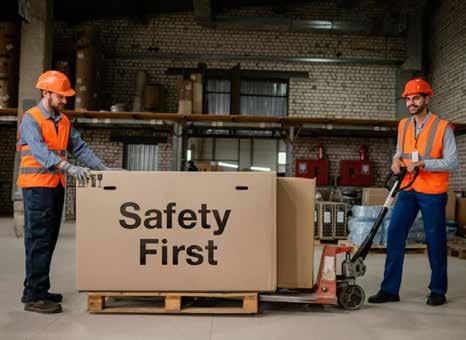
Safety matters
Working with forklifts requires a strong focus on safety, training, and operational awareness. Whether you’re an operator, supervisor, or safety manager. We bring you the details.
Certification: Operators must be trained and certified.
Daily inspections: Check brakes, tires, forks, and hydraulics before use.
Load limits: Never exceed the forklift’s rated capacity.
Visibility: Maintain 360° awareness and use mirrors or spotters.
Speed control: Drive slowly, especially around corners and pedestrians.
No passengers: Forklifts are not designed to carry extra riders.
Safe parking: Lower forks, set brake, and turn off engine when parked.
Common hazards
Operator error: Often due to poor training or fatigue.
Poor visibility: Can lead to collisions or pedestrian injuries.
Unstable loads: Improper stacking or overloading can cause tipping.
Environmental risks: Wet floors, uneven surfaces, or poor lighting.
Best practices
Pre-operational checks: Inspect equipment before each shift.
Pedestrian safety: Use warning signals and maintain safe distances.
Clear pathways: Keep aisles free of clutter and clearly marked.
Emergency preparedness: Know evacuation routes and first aid procedures.
Training and compliance

OSHA standards: In many regions, forklift operation is regulated by workplace safety laws.
Refresher courses: Regular training updates help maintain safety awareness. Record keeping: Document inspections, incidents, and certifications.
Our SynQ software delivers data-driven intelligence that empowers your business by synchronizing the performance of your people, processes and machines. The result is a level of efficiency and performance you never thought possible.
swisslog.com
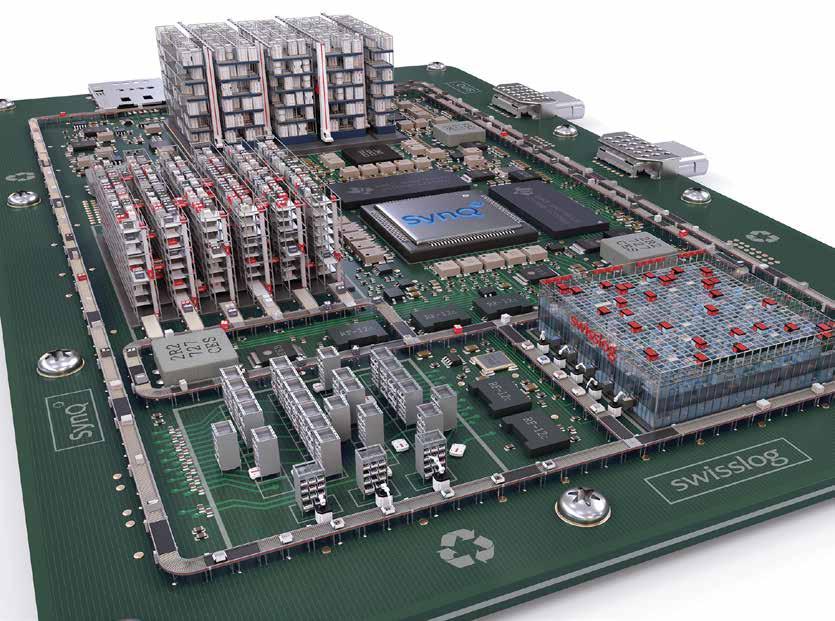
AEDLER Logistik Solutions partners with Kardex to deliver seamless intralogistics in the UAE
As the logistics and supply chain sector in the United Arab Emirates continues to evolve at an unprecedented pace, the need for smarter, more integrated warehousing solutions has never been greater. In a strategic move to meet this demand, AEDLER Logistik Solutions has joined forces with Kardex, a global leader in automated storage and retrieval systems to enhance intralogistics efficiency across the UAE.

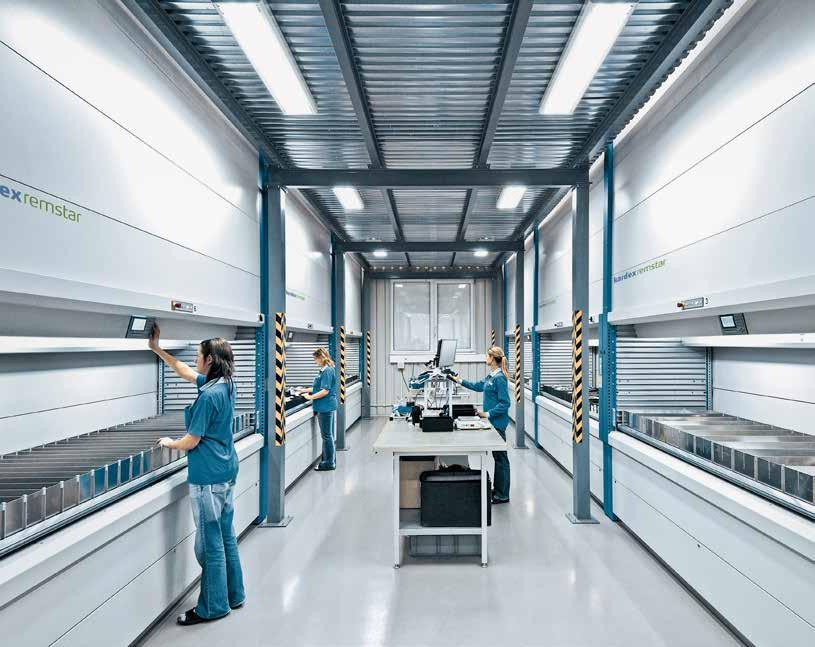
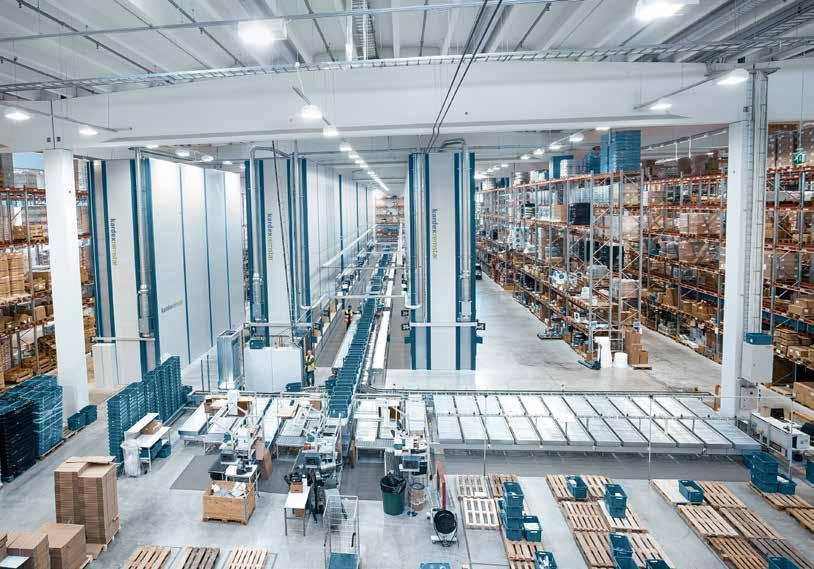
This collaboration is set to revolutionise intralogistics across the UAE by delivering cutting-edge, intelligent storage solutions tailored to the region’s growing logistics demands.
Smart storage for smart operations
At the core of this partnership is the introduction of cutting-edge Vertical Lift Modules (VLMs) and Vertical Carousel Modules (VCMs) - high-density, automated storage and retrieval systems designed to help operations reclaim up to 85% of floor space while significantly improving picking speed, accuracy, and productivity. Using a “goods-to-person” approach, VLMs bring the right part directly to the operator—eliminating wasted travel time and manual searching. Whether you’re managing a wide variety of part sizes or looking to streamline order picking, VLMs offer unmatched flexibility. They can be outfitted with trays that handle up to 1,000 kg each. For applications with heavier loads, lift assisting equipment can be added to a VLM as well. These systems
can be seamlessly integrated with barcode scanners, conveyors, and robotics—creating a fully automated, high-efficiency workflow.
VLMs can be used for automated product handling by integrating robots. With this automated integration, a robotic arm picks items out of the tray and distributes them accordingly. This versatility ensures that our storage solution evolves with your operation - whether you are scaling up, relocating or optimising across departments. VLMs deliver measurable results—more floor space, faster picks, and fewer errors. Whether used for production parts, or fulfillment, they provide a scalable, high-performance solution for modern material handling.
Seamless integration, local support
One of the remarkable features of this partnership is AEDLER’s ability to offer turnkey integration — from solution design and engineering to implementation, training, and after-sales service, ensuring that Kardex’s advanced technology is deployed with precision and adapted to the unique needs of companies
operating in the UAE. AEDLER’s customercentric approach ensures that every Kardex system is implemented with maximum efficiency, minimum disruption, and long-term operational value.
As the UAE doubles down on logistics as a strategic sector for its economic diversification plans, investments in automation and smart warehousing are no longer optional — they are essential. The AEDLER–Kardex partnership brings automation within reach for businesses of all sizes and sectors, offering an efficient solution to smarter, more responsive supply chains.
For companies ready to elevate their operations, improve margins, and meet rising customer expectations, VLMs and VCMs are no longer technologies of the future — they are crucial for today’s Industry.
The AEDLER–Kardex alliance is poised to make a significant impact across several key sectors in the UAE, especially those where space optimisation, inventory accuracy, and operational efficiency are critical.
Focusing on Q-Commerce
Q-Commerce, or Quick Commerce, is revolutionising the way supply chain companies operate by enhancing speed, convenience, and offering hyper-local fulfillment. HWArobotics is putting Q-Commerce to the test and showcases how it can reduce delivery costs and improves customer satisfaction.
HWArobotics is a global leader in warehouse automation solutions, specialising in advanced ASRS (Automated Storage and Retrieval Systems) shuttle technologies. With a DNA rooted in innovation, reliability, and scalability. We design systems that enable businesses to optimise intralogistics, enhance throughput, and achieve operational excellence,” explains Umer Saleem, Vice President Sales and Business Development.
“Our mission is to empower retailers, e-commerce players, and logistics providers with intelligent and futureready automation systems that integrate seamlessly with the demands of fastmoving consumer industries such as q-commerce, grocery, fashion, and general merchandise,” he adds.
The DNA of HWArobotics rests on three pillars:
• Innovation at scale – cuttingedge R&D and robotics design.
• Customer-centric solutions – tailored automation systems for diverse industries.
Case Study A –
Leading Chinese retail innovator
Background: One of China’s largest data and technology-driven retail platforms, fully integrating online, offline, and modern logistics. Known for its pioneering role in grocery-focused new retail, the company combines big data, IoT (Internet of Things), and automation to optimise the match between people, goods, and demand.
Configuration:
• Multi-level Shuttle Robot ASRS: 7 aisles (5 at 17 layers, 2 at 15 layers), height 7.5 meters, total 25,509 standard totes
• Shuttle Robots: 115
• Goods Lifts: 28
• Efficiency: Shuttle robots 110 boxes/ hour/set; Lifts 560 boxes/hour/set
• Global expertise, local commitment – proven deployments across Asia, Europe, and the Middle East.
Expansion: HWArobotics is expanding rapidly into the Middle East & North Africa (MENA), bringing world-class automation technologies to one of the fastest-growing logistics and e-commerce markets globally. Saleem is spearheading this expansion from the company’s Dubai hub. With nearly 17 years of experience advising businesses across multiple sectors, he is focused on building strategic partnerships with retailers, 3PLs, and last-mile logistics providers to meet the region’s surging demand for intralogistics automation.
Q-Commerce: A global movement
Quick commerce (q-commerce) represents the next stage of retail, where customer expectations demand groceries, essentials, and consumer products delivered in less than 30 minutes. Globally, q-commerce is witnessing double-digit annual growth, with billions invested in fulfillment infrastructure.
Case Study B –
Global fast fashion powerhouse
Background: Founded in 2008, this leading B2C Internet enterprise focuses on fast fashion, offering cost-effective products to consumers worldwide. With headquarters in China and branches in the US, Belgium, Dubai, and beyond, the company has penetrated North America, Europe, Russia, MENA, and India.
Configuration:
• Multi-level Shuttle Robot ASRS: 6 aisles, 15 layers, height 9 metres, total 28,800 standard totes
• Shuttle Robots: 90 (+1 spare)
• Goods Lifts: 24 (without layer changing)
• Throughput Peak: 12,000 boxes/hour (6,000 inbound + 6,000 outbound).

• Global market growth: Q-commerce has become a multi-billion-dollar industry, driven by urbanisation, smartphone adoption, and shifting consumer habits.
• MENA focus: The MENA region is uniquely positioned for q-commerce growth due to young demographics, high mobile penetration, and evolving consumer preferences. Countries like Saudi Arabia, the UAE, and Egypt are witnessing rapid adoption of on-demand delivery, especially in fresh groceries and FMCG (Fast Moving Consumer Goods).
Alignment with ASRS & Warehousing intralogistics
Q-commerce thrives on speed, efficiency, and precision—values that directly align with ASRS and intralogistics systems. By deploying shuttlebased warehouse automation, companies can:
• Maximise storage density in urban fulfillment centers.
• Achieve high throughput to meet delivery time guarantees.
• Integrate seamlessly with last-mile networks.
• Ensure scalability as demand grows. In MENA, this synergy is particularly critical as governments invest heavily in smart logistics, digital economies, and supply chain modernisation.
Fresh groceries & Q-commerce: Hand in hand
“Fresh groceries are at the heart of q-commerce. Consumers expect not just speed, but also quality and freshness,” adds Saleem. ASRS solutions enable:
• Temperature-controlled automation for perishable goods.
• Seamless stock rotation (FIFO) to guarantee freshness.
• Real-time inventory visibility, reducing waste and out-of-stock incidents. For grocery players, automation is no longer optional—it is essential for maintaining a competitive advantage.
“We’re only just getting started”
– Jessica Panigari, CEO, Goods2Load
The International Air Cargo Association, (TIACA) recently hosted this year’s Executive Summit in Hong Kong. The event served as a platform for the 2025 TIACA Awards, including the Hall of Fame, Inspirational Leader, Rising Star, and Sustainability Awards, each recognising outstanding achievements and emerging talent shaping the future of air cargo.
“The energy at this year’s Executive Summit reflects the optimism and innovation driving our industry forward, with focus on agile adaptation to evolving market conditions,” said Glyn Hughes, TIACA Director General. “From digital breakthroughs to sustainability strategies, this was a gathering of momentum,” he added.
Newly established Goods2Load was recognised for its contribution. Speaking exclusively to Global Supply Chain, its Founder and CEO, Jessica Panigari said, “Receiving the second prize in the StartUp/Small Business category at TIACA’s 7th Air Cargo Sustainability Awards is an incredible milestone for us. It affirms that the work we’re doing—quietly, consistently, and often behind the scenes—is now being recognised on a global stage.”
Founded in 2023, Goods2load is transforming the global logistics landscape with a bold, digital-first approach. Its cutting-edge platform redefines freight forwarding, delivering optimised solutions that turbocharge both time and cost efficiency. Panigari explains, “At Goods2Load, we focus on a segment of the logistics world that is often overlooked: small and medium-sized freight forwarders who are still working offline—representing nearly 80% of the global market. These are companies with deep operational knowhow but limited access to digital tools. Our platform gives them simplified visibility, connects them with demand, and helps transition their operations from analog to smarter, more sustainable workflows.
But our innovation goes beyond digital access. We are building a system
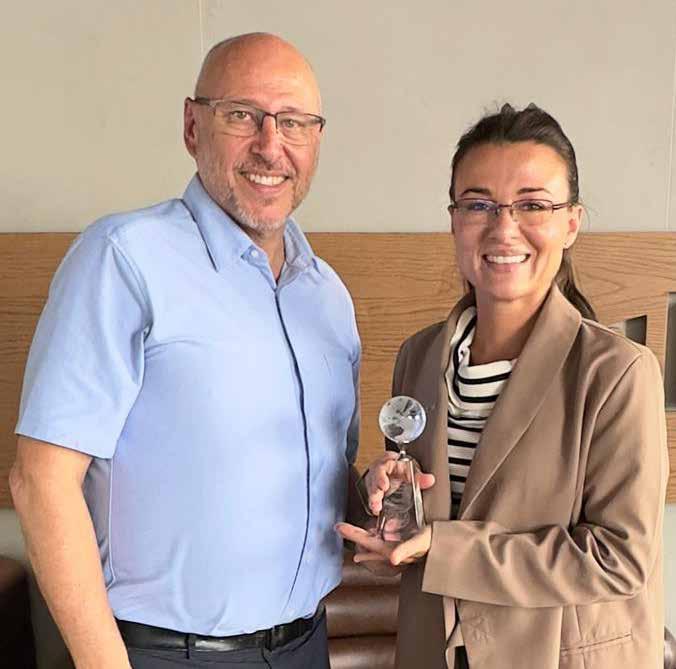
that enables shippers to not only move cargo efficiently but also choose greener solutions—filtered by CO₂ emissions, certifications, and sustainable route options. In doing so, we’re not just digitalising freight—we’re helping shape demand for more responsible logistics.”
A sustainable approach
“What sets us apart is our focus on tracing user behaviour. We collect real-time data on the types of solutions businesses are seeking—what filters they use, what matters most to them, whether it’s eco-certifications, speed, or multimodal flexibility. These insights allow us to nudge the market in the right direction by showing providers
what their customers actually value.
Being recognised in Hong Kong and standing alongside pioneers like Fraunhofer IML was humbling. We’re deeply grateful to TIACA, CHAMP Cargosystems and the expert jury for acknowledging the importance of empowering this “unseen” segment of global logistics—the offline professionals who quietly keep trade moving every day.
“This award is more than recognition— it’s a reminder that in a complex industry like logistics, the road to sustainability begins with access. When you give the right tools to the right people, you create a ripple effect that drives impact far beyond technology alone. We’re proud to be part of that ripple. And we’re only just getting started,” she concludes.
Glyn Hughes, TIACA Director General with Jessica Panigari, CEO of Goods2Load
Why supplier development holds the key to the GCC’s economic resilience
Passive localisation is no longer enough. As the GCC strives for long-term economic resilience, countries must move beyond incentives and mandates to actively build capable, competitive local suppliers. Vinay Goyal, Principal, and Soundous Boualam, Manager at Kearney Middle East & Africa - Strategic Operations Practice, explain their perspective.


Vinay Goyal, Principal, Kearney Middle East & Africa
Countries reliant on finite natural resources have long faced heightened risks amidst volatile commodity markets and rising geopolitical uncertainty. In response, many are prioritising economic diversification and domestic capacitybuilding to reduce external reliance and strengthen resilience.
GCC countries are at the forefront of driving national transformation. Through bold national visions like Saudi Arabia’s Vision 2030, they’re pushing for local industry development and economic diversification to foster innovation, competitiveness, and long-term prosperity.
Programs like Saudi Arabia’s IKTIVA and Nusaned, the UAE’s In-Country Value (ICV) Program, and Oman’s Tanfeedh initiative reflect this growing focus on reinforcing domestic industrial ecosystems. Despite progress, localisation efforts continue to face structural hurdles, as many local suppliers lack the capacity and scale to compete globally, often relying on government support that limits long-term innovation and growth.
In order to overcome structural barriers, governments and businesses are adopting structured Supplier Development Programs (SDPs) to strengthen local suppliers, enhance industrial capabilities, and drive sustainable, competitive localisation.
What’s needed now is a shift from passive localisation to strategic supplier development, and that’s where structured Supplier Development Programs (SDPs) come in.
A holistic SDP enables governments and private entities to unlock substantial value:
● It can boost an organisation’s local content score by up to 10%, supporting economic growth and aligning with national localisation policies.
● It reduces international trade risks—such as supplier, logistics, and geopolitical disruptions—by up to 45%.
● It drives operational performance: cutting costs by 10–15%, improving OTIF (On Time, In Full) performance by 20–25 points, and increasing customer satisfaction by up to 30%.

Soundous Boualam, Manager, Kearney Middle East & Africa
The benefit for local suppliers is equally powerful. SDPs give local businesses access to cutting-edge technology and expertise, raise their quality standards through assessments and certifications, and strengthen their market credibility. More importantly, they build a robust local supply base, cutting import dependence and boosting local content in key sectors.
What a successful SDP looks like
At Kearney, we’ve developed a comprehensive framework that outlines six core elements to for successful SDP design and implementation.
1. Setting the SDP strategy
A successful SDP begins with a clear, strategy-aligned vision and targets, followed by prioritising categories, forecasting demand, and setting KPIs to guide implementation and measure impact.
2. Building the Operating Model
Effective SDP execution needs a tailored operating model and structure — procurement-led, dedicated, or sectorwide — based on ambition, readiness, and stakeholder alignment.
3. Prioritising Suppliers
To maximise impact, SDPs should target high-spend, high-criticality categories and select pilot suppliers by prioritising those with strong development potential, future spend relevance, and KPI improvement opportunities—while deprioritising agents, low-potential, misaligned, or long-engaged suppliers.
“A holistic SDP drives operational performance, cuts costs by 10–15%, improving on time in full performance by 20–25 points, and increasing customer satisfaction by up to 30%.”
4. Identifying Development Initiatives
Tailored initiatives should address supplierspecific gaps, supported by enablers like access to finance, matchmaking for demand visibility, structured long-term contracts, and supply-side upgrades such as R&D and training—complemented by governmentled programs.
5. Engaging Suppliers
Organisations must communicate tailored engagement plans with clear timelines and success metrics to ensure supplier alignment, foster collaboration, and track commitment effectively.
6. Tracking and Reporting on Supplier Performance
To ensure SDP effectiveness, organisations should implement a robust performance tracking framework with dashboards for leadership and scorecards for suppliers, enabling data-driven decisions, continuous improvement, and clear visibility into progress and outcomes.
As GCC nations pursue economic competitiveness and self-sufficiency, SDPs have become vital tools to boost local industry, innovation, and resilience. To be effective, these programs must be tailored to each organisation’s business priorities, maturity level, and local supply market conditions, ensuring alignment with strategic goals and supplier capabilities. Done right, SDPs can transform local suppliers from under-leveraged players into the backbone of national growth. For the GCC, the moment to act is now.

How the Middle East can effectively electrify commercial and logistics fleets
Many businesses across the Middle East are looking at the electrification of their vehicles and fleets. While there are many environmental advantages in switching to electric vehicles (EVs), there is also an increasingly compelling case from a commercial perspective. David Auriau, CEO of Positive Zero throws more light on this.
There are several federal and citywide targets across the region, examples of which include the UAE’s aim for 50 percent of vehicles to be electric by 2050, Dubai’s Green Mobility Strategy targeting 30 percent electrification by 2030, and in line with Vision 2030 the Saudi government aims for 30 percent of Riyadh’s vehicles to be electric in the same time frame. Businesses across the region are mindful of such targets and intelligently peg their ambitions to these regional sustainability plans. By moving to electric vehicles, urban air pollution can be dramatically reduced and air quality enhanced as a result –that’s because EVs do not produce any tailpipe emissions. EVs are more energy efficient than traditional combustion
engines – various figures in recent years (dependent on vehicles and charging set-ups) suggest between 77 percent and 90 percent of the energy consumed is delivered as power at the wheels. That compares to gasoline consumption where a traditional combustion engine would deliver between 12 to 30 percent energy efficiency. Electrification initiatives are driving a smarter use of energy.
Beyond environmental benefits
For businesses, electrification offers significant operational and financial advantages, especially for certain commercial vehicle types such as last-mile delivery vans and refrigerated trucks. Commercial EVs deliver a lower total cost of ownership over their lifetime through major fuel savings
and reduced maintenance requirements. Although EVs can come at a higher upfront cost, they require less frequent servicing, which has the added advantage of reduced downtime. Fleets can also benefit from flexible private charging infrastructure to enable round the clock operations.
Challenges for commercial electrification in the Middle East
There are three core challenges in the region. The most significant barrier to widespread adoption is fuel subsidies, which reduce the cost advantage of EVs. This is changing and we are already seeing in countries like the UAE that commercial EVs are already more competitive.
Another major hurdle is the lack of longterm residual value data – this complicates
financing and leasing options, as traditional lenders are more cautious where they do not have historical depreciation trends. Banks can therefore perceive EVs as higher-risk assets. In addition, with rapid advancements in EV technology, depreciation can be accelerated because of newer models offering better performance and limited battery warranties can add risk of increased maintenance costs for older vehicles – this can prevent traditional fleet owners and leasing companies from raising the necessary financing through conventional banks.
The final obstacle is in underdeveloped charging infrastructure – quite simply, are there enough suitable chargers to operate fleet and commercial vehicles.
This is why the team at Positive Zero takes an integrated approach to addressing all three challenges. We build the necessary infrastructure to ensure regular reliable charging, we plug in renewable energy generation (such as distributed solar carports and rooftops) to reduce energy costs, and we finance the
entire system reducing operational risk and capital expenditure. With no upfront costs, businesses can take advantage of the long-term benefits of electrifying their commercial vehicles and fleets. These service contracts often include performance guarantees and reduce risk exposure for both fleet operators and financiers, making electrification more accessible and financially viable.
Predicting the direction of travel for fleet electrification
Fleet electrification is accelerating, driven by declining purchase prices, intelligent financing models and reduced fuel subsidies, in line with 2030 strategies. Commercial EVs are rapidly reaching cost parity and are overtaking conventional vehicles across a range of segments, driving fleet operators to transition to electric solutions. We are also seeing the rise of private sector charging infrastructure to accelerate deployment and provide operational advantages for commercial fleets. This private infrastructure will

be coupled with distributed solar generation and energy storage systems to provide on-demand power and reliable, cost-effective EV charging. These technologies will not only support grid stability but contribute to reducing the overall cost of fleet electrification for businesses across the region.
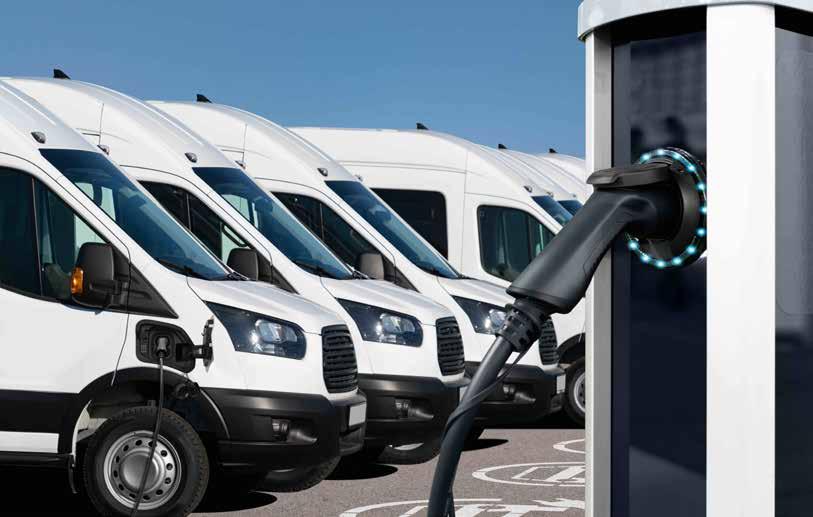
David Auriau, CEO of Positive Zero
Tata Motors to acquire Iveco Group, together creating a global player in commercial vehicles
The combination brings together complementary capabilities, global reach, and a shared strategic vision to drive long-term growth and unlock significant value Iveco Group Board recommends Tata Motors’ all-cash voluntary tender offer for Iveco Group common shares. Completion of the offer is conditional on the separation of Iveco Group’s defence business.
Iveco Group N.V. (“Iveco Group” or “Iveco”) (EXM: IVG), a European leader in commercial vehicles and mobility, and Tata Motors Limited (“Tata Motors”) (NSE: TATAMOTORS), a global automotive leader, announced that they have reached an agreement to create a commercial vehicles group with the reach, product portfolio and industrial capability to be a global champion in this dynamic sector. The envisaged recommended voluntary tender offer (the “Offer”) will be made by TML CV Holdings PTE LTD or a new limited liability company to be incorporated under Dutch law (the “Offeror”), which will be wholly owned, directly or indirectly, by Tata Motors. The completion of the offer is conditional, inter alia, on the separation of Iveco’s defence business and, as such, the public offer is for all issued common shares of Iveco Group after the separation of that business, at a price of EUR 14.1 (cum dividend, excluding any dividend distributed in relation to the sale of the defence business) per share in cash (the “Offer Price”). The Offer represents a total consideration of approximately EUR 3.8 billion for Iveco Group, excluding Iveco’s defence business and the net proceeds from the defence business separation.
Offer highlights
The Offer Price along with the estimated extraordinary dividend to be distributed to shareholders in relation to the sale of the defence business (assumed at EUR 5.5-6.0 per share) represents a:
● 22%-25% premium to the volumeweighted average price for the three months to 17 July 2025 of EUR 16.02 (prior to any speculation around a possible offer) ● 34%-41% premium based on the
volume-weighted average price for the three months to 17 July 2025 of EUR 16.02 (prior to any speculation around a possible offer) after deducting the EUR 5.5- 6.0 per share estimated extraordinary dividend afore mentioned.
The estimated EUR 5.5-6.0 per share extraordinary dividend is based on the €1.7bn enterprise value for the sale of the defence business and it remains subject to completion adjustments. For further information, please refer to Section E of the Offer Document, which will be published in accordance with applicable law, and to the press release related to the sale of the defence business.
The Iveco Group Board of Directors (the “Iveco Board”) unanimously and fully supports the Offer and recommends the Offer for acceptance by the shareholders of Iveco
Exor N.V. (“Exor”), Iveco Group’s largest shareholder, has irrevocably committed to support the Offer and tender its shareholding representing approximately 27.06% of Iveco Group’s common shares and 43.11% of all voting rights
The Offeror has committed financing in place for the entire Offer Price, providing certainty of funds and high certainty of deal completion
The Offeror is committed to supporting and accelerating Iveco’s existing strategy and to ensuring the long- term interests of all Iveco’s stakeholders, including employees, suppliers and customers
The Offeror has agreed to a robust set of non-financial covenants for two years following the date of the settlement of the Offer
The Offer is subject to obtaining the
required merger control, foreign direct investment, EU Foreign Subsidies Regulation and financial regulatory clearances, and is expected to complete in the first half of 2026
The sale of the companies of the defence business is envisaged to close in Q1 2026 and ultimately no later than 31st March 2026.
A powerful combination to create a global leader in commercial vehicles
The offer would bring together two businesses with highly complementary product portfolios and capabilities and with substantially no overlap in their industrial and geographic footprints, creating a stronger, more diversified entity with a significant global presence and sales of over c.540k units per year. Together, Iveco and the commercial vehicle business of Tata Motors will have combined revenues of c.€22bn (INR 2,20,000Cr+) split across Europe (c.50%), India (c.35%) and the Americas (c.15%) with attractive positions in emerging markets in Asia and Africa.
The combined group will be better positioned to invest in and deliver innovative, sustainable mobility solutions by leveraging both supplier networks to serve customers globally. It will also unlock superior growth opportunities and create significant value for all stakeholders in a dynamic marketplace. By preserving each group’s industrial footprint and employee communities, this complementarity is also expected to foster a smooth and successful integration process.
Furthermore, in the context of the ongoing, rapid transformation of the global commercial vehicle industry, the strategic combination of the commercial vehicle business of Tata Motors and Iveco Group will transform both entities,
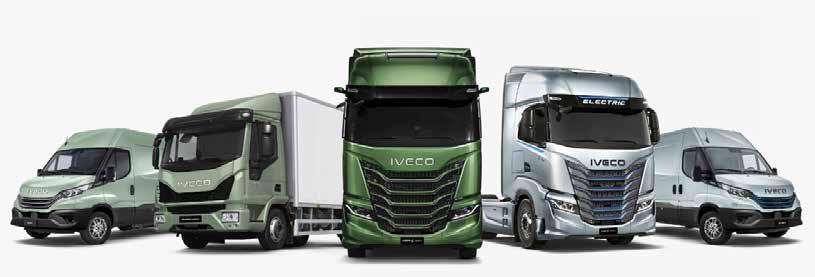
creating a robust platform with a global customer base and geographically diverse footprint. The new company will be able to drive better operating leverage by spreading its capital investments over larger volumes, generating important efficiencies and reducing the cash flow volatility inherent in the commercial vehicles sector. It will also enable the capabilities of Iveco Group’s successful powertrain business, FPT, to be further enhanced.
Natarajan Chandrasekaran, Chairman of Tata Motors said, “This is a logical next step following the demerger of the Tata Motors Commercial Vehicle business and will allow the combined group to compete on a truly global basis with two strategic home markets in India and Europe. The combined group’s complementary businesses and greater reach will enhance our ability to invest boldly. I look forward to securing the necessary approvals and concluding the transaction in the coming months.”
Suzanne Heywood, Chair of Iveco Group adds, “We are proud to announce this strategically significant combination, which brings together two businesses with a shared vision for sustainable mobility. Moreover, the reinforced prospects of the new combination are strongly positive in terms of the security of employment and industrial footprint of Iveco Group as a whole.”
Girish Wagh, Executive Director of Tata Motors says, “This combination is a strategic leap forward in our ambition to build a future-ready commercial vehicle ecosystem. By integrating the strengths of
both organisations we are unlocking new avenues for operational excellence, product innovation and customer-centric solutions. This partnership not only enhances our ability to serve diverse mobility needs across markets, but also reinforces our commitment to delivering sustainable transport solutions that are aligned with global megatrends.
Olof Persson, CEO of Iveco Group states, “By joining forces with Tata Motors, we are unlocking new potential to further enhance our industrial capabilities, accelerate innovation in zero-emission transport, and expand our reach in key global markets. This combination will allow us to better serve our customers with a broader, more advanced product portfolio and deliver long-term value to all stakeholders.”
Full and unanimous support and recommendation by the Iveco Board
The Iveco Board has concluded that the Offer is in the long-term interests of Iveco, the sustainable success of its business and employees, customers, shareholders and other stakeholders and therefore unanimously supports the Offer and recommends the Offer for acceptance by Iveco’s shareholders pursuant to applicable laws and regulations.
The Iveco Board recommends that Iveco’s shareholders vote in favor of the resolutions relating to the Offer at the extraordinary general meeting of Iveco (the “EGM”) to be held during the acceptance period of the Offer.
The Iveco Board has, in connection with and for the purpose of, the entering into and
signing of this merger agreement, received on the date hereof, a fairness opinion from Goldman Sachs Bank Europe SE, Succursale Italia (“Goldman Sachs”) to the effect that, as of such date and subject to the qualifications, limitations, and assumptions set forth in the fairness opinion, (i) the Offer Price is fair, from a financial point of view, to the holders of Iveco’s common shares (other than the Offeror and any of its affiliates) in connection with the Offer, and (ii) if applicable, the Purchase Price (as defined in the share purchase agreement attached to the merger agreement) is fair, from a financial point of view, to the Company in connection with the Share Sale (as defined below).
Irrevocable undertaking by Iveco’s largest shareholder Exor, Iveco’s largest shareholder with approximately 27.06% of Iveco’s common shares and 43.11% of all voting rights, has today executed an irrevocable undertaking to support the Offer and tender its shareholding and vote in favour of the resolutions that will be proposed at the EGM to be held in connection with the Offer. Subject to settlement of the Offer, Exor has agreed to transfer its special voting shares back to Iveco for nil consideration.
Iveco has agreed to procure that all Iveco Board members holding in aggregate approximately 1.39% of Iveco’s common shares shall, subject to the terms and conditions of the merger agreement, tender all Iveco’s common shares held by them in the Offer and vote in favour of the resolutions that will be proposed at the EGM to be held in connection with the Offer.
Scania’s strategic progress continues amid softening demand
● Scania Group sales revenue declined by 10 percent to SEK 49.9 billion (55.4)
● Adjusted operating result at SEK 4.5 billion (8.0), with a 9.0 percent (14.5) adjusted return on sales
● Vehicle deliveries (unit sales) decreased by 5 percent to 24,602 vehicles, whereof Zero Emission Vehicles (ZEV) amounted to 117 units (62)
● Incoming orders increased by 6 percent to 20,393 vehicles, whereof Zero Emission Vehicles amounted to 156 units (141)
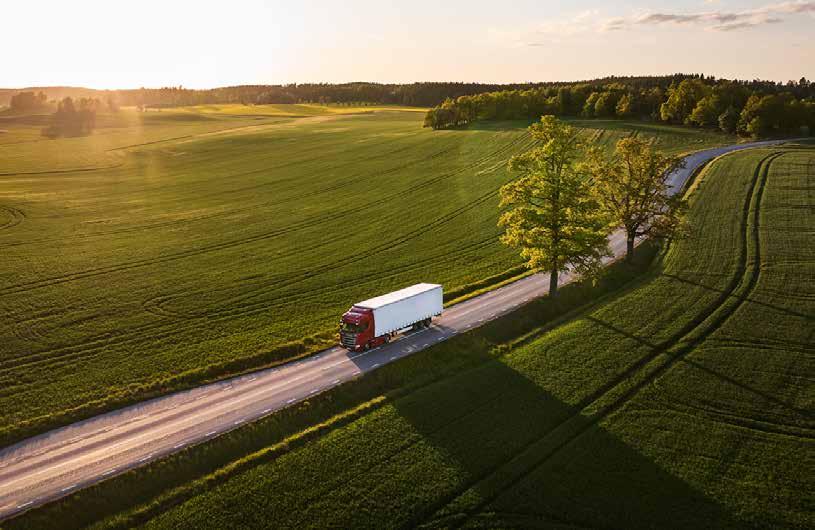
Scania delivered a resilient performance, balancing short-term challenges with long-term strategic progress, in a more challenging macro-economic environment.
Sales revenue and adjusted operating results were down in the second quarter compared to the same period last year, largely due to lower delivery volumes and currency headwinds.
Scania is a world-leading provider of transport solutions. In 2024, the company delivered 96,443 trucks, 5,626 buses as well as 11,170 industrial and marine power systems to its customers. Net
sales totalled over SEK 216 billion, of which about 20 percent were services related. Founded in 1891, Scania now operates in more than 100 countries and employs around 59,000 people. Research and development is carried out globally with its main site in Södertälje, Sweden. Production takes place in Europe and Latin America with regional product centres in Africa and Asia.
Truck deliveries decreased, with Brazil seeing the sharpest decline due to a weakened market driven by high interest rates, inflation and elevated dealer stocks.
Scania’s total vehicle order intake
increased, supported by stronger demand in Europe compared to the second quarter last year. However, the upward trend in order intake seen in previous quarters has reversed.
Despite headwinds, Scania maintained a strong position in Europe, with a stable market share of 17.9 percent in a contracting heavy truck market.
“While the macro environment remains unstable, I’m confident we are in a strong and unique position to play a leading role in shaping the future of our industry,” says Christian Levin, President and CEO of Scania and TRATON Group.
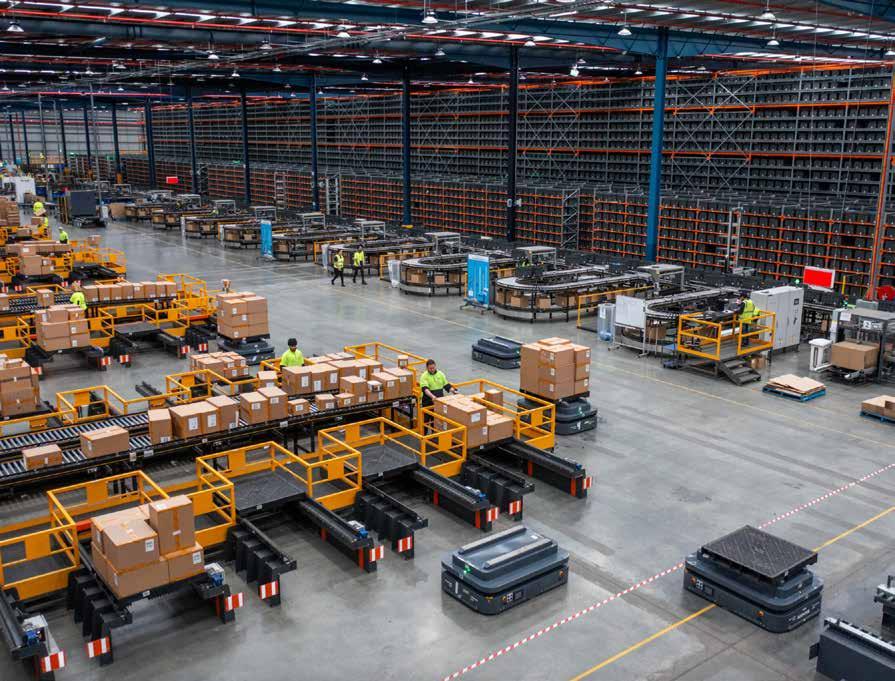

Supplying every grain of rice
UAE’s strategic logistics approach powering a seamless supply of rice
Rice is a staple food in most UAE households, playing a fundamental role in the nation’s delectable cuisines. However, the complex logistics process behind ensuring its timely and steady supply is often overlooked. Behind every grain on our plate, there is a sophisticated process that starts in paddy fields and extends across borders, ports, warehouses and retail stores.

From procurement to distribution, each step is designed to ensure quality, preserve natural texture and flavour, and maintain undisrupted supply.
As the country continues to grow its food imports, the journey of rice stands as a prime example of its efficient logistics approach, driven by precision, stringent regulations and continuous innovation. Over the years, the UAE has been committed to bringing together world-class logistics infrastructure, robust regulations and in-depth industry knowledge to ensure seamless supply of the finest quality of rice, along with other food products, to consumers across the country.
From paddy fields to UAE households
In the UAE, especially in Dubai, the rice business has evolved into a highly lucrative sector. Dubai’s role as a trade gateway between the East and West has been instrumental in establishing the country as a key rice trading hub. Furthermore, the nation’s strategic location, state-of-
the-art infrastructure, business-friendly environment and multicultural expatriate population, have attracted numerous importers and distributors, who have both leveraged as well as contributed to the market’s growth. The UAE’s rice market is particularly shaped by imports of premium varieties, such as Basmati rice from India and Pakistan.
This journey of rice from paddy fields of key suppliers, such as from Asian countries to the local markets involves a complex web of international regulations and shipping lanes. In the UAE, ports such as Jebel Ali and Khalifa Port serve not only as entry points but also as pivotal logistical hubs designed to handle enormous volumes of cargo and ensure timely, compliant distribution of goods.
Apart from infrastructure, the country has also laid down stringent food safety standards to ensure the quality of the produce. For instance, every consignment of food products arriving in the country must have comprehensive documentation, including health certificates, certificates
of origin, and often Halal certification, depending on the product and source. In addition, the country’s regulations mandate product registration through systems like Dubai Municipality’s FIRS or ADAFSA in Abu Dhabi to ensure compliance with labelling requirements, including labels in Arabic and English with clear production date, expiry date and quality benchmarks.
Even minor discrepancies like a missing stamp or an illegible date can result in various setbacks, including shipment delays, port detention or rejection. These challenges highlight the importance of precision in every step. Furthermore, the strictly regulated environment requires a robust, tech-enabled system capable of tracking shipments, managing documentation and maintaining real-time communication between international suppliers and local importers.
Preserving quality through advanced infrastructure
After customs and food authorities’ inspections, the next phase is storage, during which rice will be promptly moved to warehouses across the country.
Considering the UAE’s extremely hot and humid climate, proper warehousing is not an option, it is a necessity. Climatecontrolled warehouses are crucial in protecting the rice from external elements and preserving its quality throughout storage. This phase relies on efficient handling, strict hygiene protocols and regular quality checks.
Furthermore, by adhering to best industry practices, these storage facilities integrate Warehouse Management Systems (WMS)
for real-time inventory tracking, optimised slotting, and adherence to ‘First-In, FirstOut’ (FIFO) method. These measures are critical for maintaining product integrity, reducing possibilities of any disruptions and consistently delivering high-quality rice across the country.
Journey from warehouse to table
Distribution is the final step of the rice supply chain, where precision is substantial. In a country like the UAE, with its vibrant cities and huge retail ecosystem, ensuring timely delivery of products requires an efficient and adaptable logistics network. Once rice reaches central warehouses, it is then dispatched to various endpoints like hypermarkets, supermarkets, convenience stores, hotels, restaurants and catering companies.
This complex process, involving major retail hubs and individual outlets, relies on a multi-tiered logistics model. To meet the speed and precision required for this process, logistics providers leverage technologies such as route optimisation software, real-time vehicle tracking, and cold chain monitoring. These technologies also help manage diverse order sizes, varying delivery schedules, and the dynamic demands of the market, whether for regular demand or urgent requests, setting a standard for consistent product delivery despite any setbacks.
The logistics of rice in the UAE represents a vital yet often overlooked pillar of national food security. Strategic partnerships between government bodies and industry players have been playing a key role in ensuring the nation’s food demand and supply. From global sourcing to efficient nationwide distribution, these stakeholders manage a complex system of procurement, logistics, storage and delivery that operates around the clock. As the market continues to evolve, industry players strive to stay ahead of the curve by adopting smart infrastructure and investing in innovation, further ensuring uninterrupted supply of premium quality rice to the vast population.
By Gautam Aggarwal, Managing Director, Gautam General Trading LLC
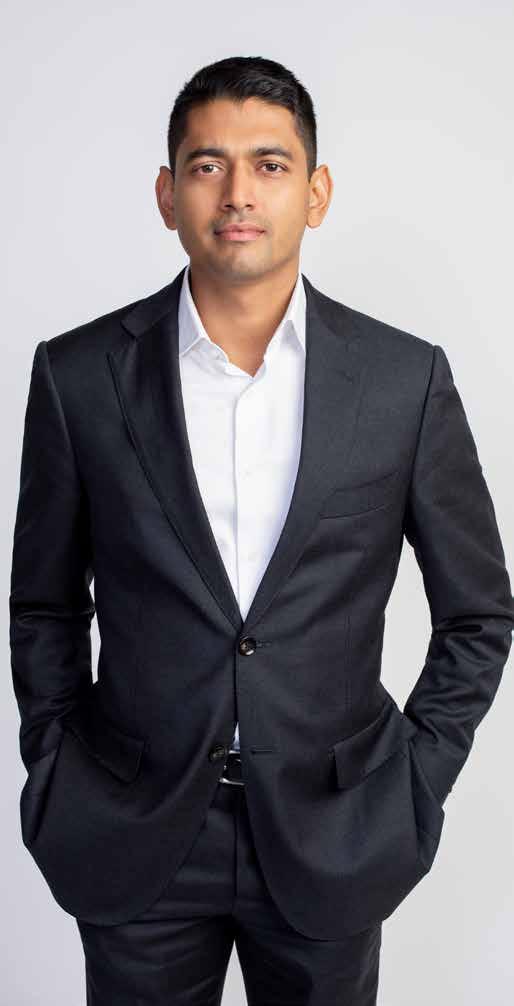
“Gautam Rice”
Julien Calloud appointed CEO of SAVOYE
Sheng Ding, President of SAVOYE, announced the appointment of Julien Calloud as Chief Executive Officer. This strategic appointment from June 2025, marks a new chapter for SAVOYE, a French company specialising in intralogistics solutions and supply chain software. With a strong technological foundation, recognised expertise, and a robust network of distributor-integrators, SAVOYE supports clients both in France and internationally.
In his new role, Julien Calloud will oversee the strategic and operational management of the company. His mission is to coordinate all departments and further strengthen SAVOYE’s momentum in innovation and sustainable growth.
A dual French-German graduate of the European Institute of Advanced Business Studies in Strasbourg, Julien Calloud brings over 20 years of industrial experience, including eight years in the intralogistics sector. He began his career in 2005 at Daimler Buses, where he held several key positions: Supply Chain Manager, Head of Training and Documentation, After-Sales Director, and Sales Director. In 2017, he joined Jungheinrich France as Managing Director Sales and was appointed President of the French subsidiary in 2019, contributing to the company’s sustained growth and market consolidation.
Julien Calloud commented, “I am thrilled to join the SAVOYE team and to contribute to an ambitious company project focused on innovation and sustainable growth. SAVOYE’s expertise is widely recognized across the industry and is deeply rooted in its history, its people, and its strong identity. I look forward to shaping this exciting new chapter together.”
He succeeds Rico Back, who has served as interim CEO since July 2024 with the assistance of Christian Herrlich from SKR consulting firm. Sheng Ding extends his sincere thanks to Mr Back and Mr Herrlich for their dedication and leadership during this transition period.

Julien Calloud will be supported by an experienced Executive Committee, composed of:
• Marc Duray, Chief Information Systems Officer
• Frédéric Fragne, Customer Lifecycle services Director
• Massimiliano Fochetti, Chief Sales Officer
• Anthony Gautheron, Chief Technology Officer
• Rémi Jiguet, Chief Operating Officer
• Sébastien Jollivet, Human Resources Director
• Ottavio Rivelli, Chief Digital Officer
• and Jean-François Sturmel, Chief Financial Officer
Sheng Ding, President of SAVOYE concludes, “Julien Calloud’s appointment is fully aligned with our long-term development strategy. His expertise, leadership, and deep understanding of the sector will be invaluable assets as we guide SAVOYE through its next phase of growth.”
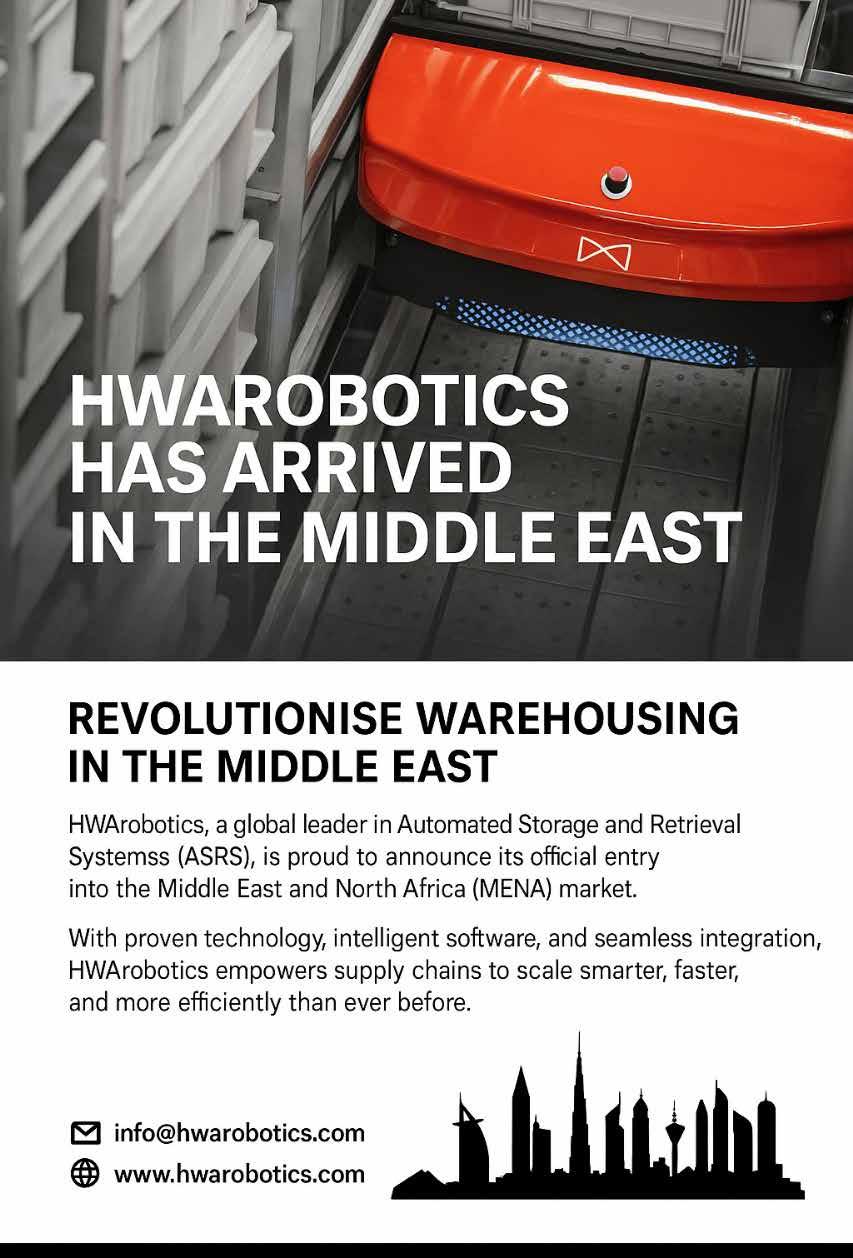
“In the near future shipyards will operate entirely on renewable energy”
Eng.
Jamal S. Abki, General Manager, Grandweld Shipyards
Sustainability is reshaping the maritime industry, and Grandweld Shipyards is at the forefront of this transformation in the Middle East. Global Supply Chain sits down with Eng. Jamal S. Abki, General Manager, to explore how the company is turning ambitious green initiatives, smart shipbuilding technologies, and data-driven innovations into tangible results. He also shares insights on how Grandweld and the UAE are positioning the region as a global leader in sustainable maritime and clean energy solutions.
GSC: What inspired Grandweld to pursue sustainability so aggressively, and how does this align with the UAE’s broader clean energy goals?
JA: As one of the leading shipbuilders in the Middle East, we have been closely monitoring the environmental footprint of maritime activities. This has driven us to pursue sustainability not only as a responsibility but also as a pivotal opportunity to lead by example within the industry. As a result, in 2024, we became the first shipbuilding company in the Middle East to generate renewable energy on a large scale. We are also on track to meet 100 per cent of our energy needs through clean sources by the end of this year. Phase one of our solar project is already powering 50 per cent of our operations. These efforts directly align with various national agendas, including the UAE’s Dubai Clean Energy Strategy 2050, Dubai Net Zero Emissions Strategy 2050, and the national Net Zero by 2050 initiative, all of which aim to boost the share of renewables, cut emissions and position the UAE as a global leader in sustainable industries. As the company continues to evolve, we are committed to turning the nation’s sustainability goals into tangible results that benefit both the environment and the maritime sector.
GSC: Can you elaborate on your roadmap to becoming a 100 per cent green shipyard? What milestones
have you achieved so far, and what challenges remain?
JA: As part of our roadmap towards becoming a 100 per cent green shipyard, we have taken several key measures to transform our facilities and operations. One of the key milestones among them is the redesigning of our facility at Dubai Maritime City (DMC) to comply with the premium green building standards. We are also progressing on our renewable energy journey, with phase one of our solar initiative installed with 569 kWp (kilo Watt peak) capacity now supplying 50 per cent of operational energy needs. Phase two, which is scheduled for completion by the end of 2025, will increase the capacity to 1.3 MW, enabling us to meet 100 per cent of our requirements and generate surplus energy. Beyond solar, we have also adopted advanced energy-efficient features, such as light-sensitive building systems and eco-friendly construction principles at our shipyard. Furthermore, in line with our commitment to environmental sustainability, we leverage hydro blasting for hull paint removal, which significantly reduces pollution, eliminates harmful airborne particles and lowers water contamination, while improving workplace safety.
GSC: What does a sustainable future look like for the shipbuilding and maritime industry?
JA: Currently, growing environmental concerns are reshaping shipbuilding practices, driving a shift towards reduced carbon emissions, fuel consumption and overall environmental impact. This transition requires innovative solutions in ship design, use of alternative fuels, improved operational efficiencies, stronger collaboration and renewed commitment towards a circular economy. In the near future shipyards will operate entirely on renewable energy, where vessels are built from the keel up to operate with low or zero emissions, and where resource efficiency is embedded at every stage. Green fuels such as LNG, methanol or hydrogen, along with circular economy practices to reuse materials and leveraging data and
automation will optimise every voyage and enhance fuel efficiency. In the Middle East, there is a growing opportunity to become a hub for retrofitting and modernising fleets for cleaner operations. We are witnessing a shift towards low-emission and zero-emission vessels, alongside an increased rate in the adoption of green port technologies and practices. This aligns with the global target set by the International Maritime Organisation (IMO) to achieve netzero GHG emissions by or around 2050, with interim goals of reducing emissions by 20 per cent (strive for 30 per cent) by 2030 and 70 per cent (strive for 80 per cent) by 2040.
GSC: Can you tell us about some of the smart technological advancements and innovations in shipbuilding processes and operations?
JA: At Grandweld, innovation is deeply integrated into every stage of our shipbuilding process. Our shipyard, the largest in Dubai Maritime City, spans over 55,000 m² and features state-of-the-art infrastructure, including a 6,000-tonne synchronised lift, multiple overhead cranes, CNC machining workshops and outfitting yards designed to ensure uninterrupted and safe shipbuilding.
In line with our commitment to technological innovation, over the past two decades, we have completely digitised all major operations, from design and ERP to production workflows. This transformation has helped us create an integrated system where engineering, planning and execution are seamlessly linked. Our digital ecosystem includes an integrated ERP system, digitised engineering and streamlined project management and production data flows, positioning Dubai as the leader in advanced shipbuilding. This comprehensive digital transformation allows us to deliver highquality, cost-competitive vessels faster than conventional methods. We continue to embrace technologies by adopting cutting-edge solutions such as artificial intelligence (AI), predictive maintenance and fuel optimisation. Each ship is equipped
with comprehensive digitalisation packages, enabling remote monitoring and data analytics that improve performance while reducing downtime and environmental impact. In addition, the use of precision 3D hull modelling for drag-optimised designs results in fuel efficiency gains.
GSC: Please comment on the UAE’s rising global profile as a maritime innovation hub.
JA: Over the years, the UAE has established itself as a leading global maritime innovation hub. Its consistent achievements, forward-thinking legislation and strategic investments have contributed to positioning the country as a primary model in maritime sustainability, infrastructure development and governance. The maritime sector also plays a critical role in the UAE’s economic landscape, which contributes approximately AED 135 billion to the national GDP. Additionally, UAE-based companies have expanded their maritime investments to over 78 countries, further supporting the development of ports and maritime terminals, building global trade corridors and accelerating digitalisation and automation in international shipping. The national entities now operate 106 ports worldwide, demonstrating the country’s strong logistical capabilities and its key role in connecting global markets.
Geographically located at the crossroads of Europe, Asia, and Africa, the UAE has capitalised on its strategic position to become a key transshipment and logistics hub. However, its ambitions extend well beyond trade and connectivity. The nation is now leading in maritime legislation, technological innovation and workforce development. With the launch of the National Maritime Navigation Centre, the nation has enhanced surveillance, regulatory coordination and operational efficiency through the use of smart systems under the Ministry of Energy and Infrastructure. Furthermore, the UAE Maritime Decarbonisation Centre, which was launched in partnership with DNV, positions the country at the forefront of regional efforts to promote sustainability and reduce greenhouse gas emissions in the sector.
In addition, the country is pioneering the adoption of digital and smart maritime
solutions. Initiatives such as Blue Pass, Maqta Gateway, the BoxBay intelligent container storage system, CargoSpeed, and advanced container loading automation in Abu Dhabi and Dubai ports are transforming maritime operations. These technologies not only improve supply chain efficiency but also reduce carbon emissions, offering a comprehensive and scalable model for smart, sustainable logistics.
GSC: How can regional shipyards balance economic performance with environmental commitments?
JA: One of the most important steps is recognising that sustainability and profitability are not opposing goals, in fact, they can support one another. Our solar project is a prime example, while it reduces our environmental impact, it will also pay for itself over time through lower energy costs and strengthens our market reputation. Improving efficiency in materials, energy use, and labour not only reduces operational costs but also boosts productivity. The key is to integrate environmental objectives into the core business strategy, rather than considering them as an optional step or additional initiative.
GSC: What role does data-driven optimisation play in your ship design and operations? Could you share examples of how analytics have led to a more sustainable outcomes?
JA: At Grandweld, we use date-driven optimisation to align our vessel designs with evolving industry standards, while reducing waste and environmental impact. By collecting and analysing operational data, we have identified exact power requirements of each vessel, avoiding the use of larger engines. A key example of our efforts is the launch of battery-operated hybrid vessels, which combine diesel and battery to optimise power consumption and lower emissions. Our eco-friendly vessel designs and long-term partnerships, demonstrate our unwavering commitment to innovation, environmental responsibility and client satisfaction. These efforts not only reinforce our market position but also contribute to sustainability of our oceans.

GSC: Are there plans to integrate AI or IoT technologies further into your vessels to enhance sustainability and operational efficiency?
JA: As mentioned earlier, we are already leveraging the AI and IoT capabilities as part of our smart technology initiatives, aimed at making our vessels smarter, greener and more efficient. Through the deployment of ERP systems, 3D modelling and data-driven workflows, we have created a robust foundation in the field of digital shipbuilding. A key area we leverage AI technology is predictive maintenance, where it helps reduce downtime and lower operational costs by detecting potential failures before they occur. We also employ cutting-edge technologies in our stress and thickness measurement systems, allowing us to calculate tolerances with high precision and address any structural concerns proactively.
GSC: What advice would you give to other shipyards or maritime companies looking to begin their sustainability journey?
Begin with clear, measurable goals and ensure that sustainability is integrated into core business strategy. In today’s maritime industry, embracing technology is not an option, rather, it is a necessity for attaining sustainability, fostering a culture of responsibility, tracking progress, and collaborating with industry partners. Gradual, consistent efforts are the key to making a meaningful impact, and it can reinforce the competitive edge of your business in the rapidly evolving maritime landscape.
Al-Jasser lays foundation for Logistics Corridor
n HE Eng. Saleh bin Nasser Al-Jasser, Minister of Transport and Logistic Services and Chairman of the Saudi Ports Authority, laid the foundation stone for the logistics corridor connecting Jeddah Islamic Port to the Al-Khumrah Logistics Park. The ceremony was attended by the President of Mawani, Eng. Suliman Almazroua, along with senior officials and leaders from the transport and logistics ecosystem.
The project, executed by Mawani with a value exceeding SAR 689 million, aims to establish a dedicated and direct logistics corridor linking Jeddah Islamic Port with the Al-Khumrah Logistics Park. The corridor stretches 17 kilometres and includes two lanes in each direction. A total of 12 bridges will be constructed along the route to facilitate the movement of trucks between the port and the logistics park, eliminating the need to use the city’s internal road network.
His Excellency Minister Al-Jasser stated that this direct logistics corridor will significantly enhance truck movement efficiency and increase the handling capacity of Jeddah Islamic Port by 10%. The project will also support the integration of transport modes, strengthen supply chains, and improve infrastructure development.
He added that the dedicated corridor will ease truck flow, enhance traffic efficiency, and improve road safety in Jeddah by reducing congestion through the separation of heavy truck traffic from general traffic routes. It will also eliminate visual and noise pollution around the port area.
Strengthening supply chains
This step is part of Mawani’s ongoing efforts to boost the operational efficiency of Jeddah Islamic Port by leveraging the strategic value of the Al-Khumrah Logistics Park. It aligns with the objectives of the National Transport
and Logistics Strategy (NTLS), to solidify the Kingdom’s standing as a global logistics hub bridging the three continents.
The project will also include emergency access points, maintenance facilities, and a complete rainwater drainage system. It contributes to improving quality of life by lowering carbon emissions and preventing truck congestion.
This corridor will deliver a range of benefits to transporters, importers, exporters, logistics park users, and shipping lines by streamlining cargo and container movement and enhancing supply chain efficiency. It also presents new investment opportunities in the region.
It is worth noting that Jeddah Islamic Port is a major logistics and trade hub on the Red Sea coast. It spans 12.5 square kilometres and includes 62 multi-purpose berths, as well as a number of specialised terminals and state-of-the-art facilities.
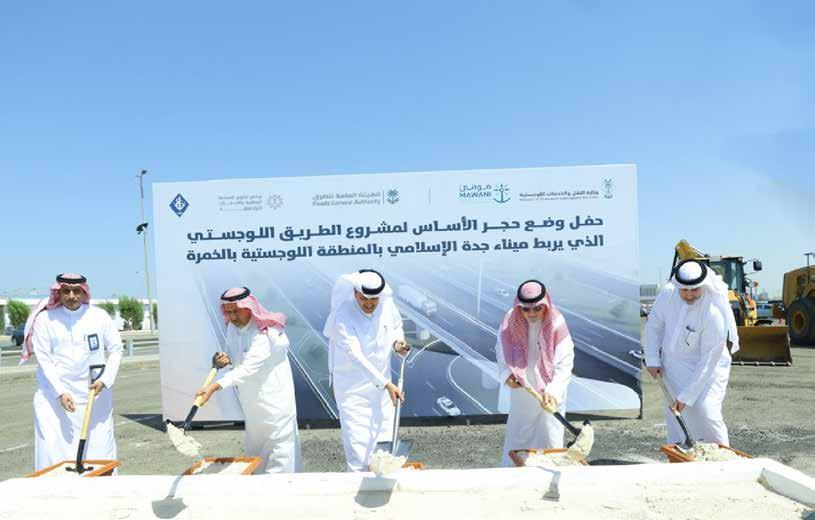
CIPS advances women’s procurement leadership in Riyadh with latest professional event
n The Chartered Institute of Procurement & Supply (CIPS) has continued its commitment to advancing gender diversity in procurement with its latest Women in Procurement Leadership Breakfast in Riyadh, Kingdom of Saudi Arabia. Building on previous successful events in the region, the gathering brought together senior female procurement professionals from across the Kingdom for a morning of inspiration, insight, and community-building.
The event focused on the journey to leadership for women in procurement –sharing real-world experiences, practical strategies and forward-looking perspectives. Participants left inspired and empowered, equipped with tools and connections to help accelerate their professional growth.
Key topics of discussion included the importance of recognised professional development pathways such as the MCIPS designation and the Applied Learning programme. Speakers and panellists explored themes such as building confidence, personal branding and strategic influence, while creating space for meaningful connection and peer support in an inclusive, collaborative setting.
Participants highlighted the relevance
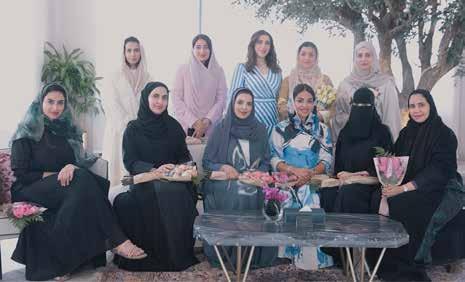
of the content, the strength of the connections made, and the value of CIPSled professional pathways in accelerating women’s leadership potential.
Lubna Al Mohammedi, Head of Operations, CIPS Arabia, commented: “This event was more than just a gathering - it was a powerful reminder of the strength, talent and leadership potential of women in procurement across the Kingdom. We’re
proud to be building a supportive space where women can learn from one another, grow their careers, and take meaningful steps towards leadership.”
CIPS confirmed that the next Women in Procurement Leadership Breakfast will take place in Riyadh in September 2025, continuing the conversation and strengthening the pipeline of female leadership in procurement across the region.
Globe Air Cargo Switzerland secures historic GSSA contract
n Globe Air Cargo Switzerland, part of the ECS Group, proudly announces the signing of a landmark GSSA agreement with Thai Airways. This new partnership marks a major milestone in ECS Group’s expansion strategy in Switzerland and across Europe.
Key Operational Highlights
• Effective Date: August 1, 2025
• Type of Contract: GSSA
• Flight Frequency: Daily departures from Zurich (ZRH)
• Aircraft Operated: Airbus A350 / Boeing 787
• Main Route: Zurich – Bangkok, with access to the full Thai Airways network across Asia and Australia
Commodities Transported
The contract will focus on the shipment of high-value and strategic goods, including:
• Consolidated cargo
• High-tech products
• Pharmaceuticals
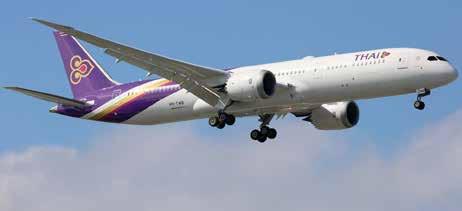
A Strategic Partnership
This agreement extends a longstanding collaboration between Thai Airways and ECS Group in several countries, and for the first time, brings Thai Airways’ cargo operations in Switzerland under the management of
Globe Air Cargo Switzerland.
“This partnership with Thai Airways in Switzerland perfectly illustrates our expansion strategy and the trust placed in us by leading global airlines. It is a major step that reflects our ongoing commitment to delivering tailor-made cargo solutions for every market. We are proud to open this new chapter with Thai Airways and to reinforce our leadership in the Swiss market.”
SolitAir partners with Eight Wings Aerospace for comprehensive technical and logistics support
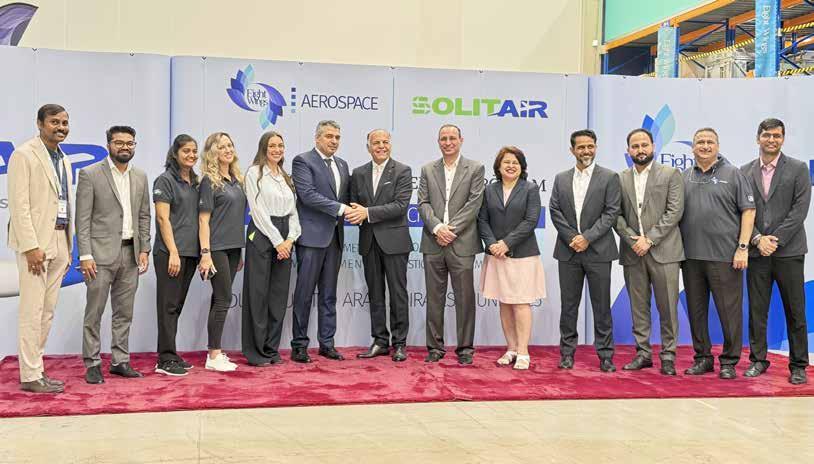
n SolitAir, the UAE’s dedicated cargo airline operating express daily scheduled services between Dubai and high-yield key trade routes across the Global South, has announced a strategic partnership with Eight Wings Aerospace, a leading provider of aerospace solutions. This collaboration will see Eight Wings Aerospace deliver a comprehensive suite of services to SolitAir, including Technical Procurement, Repair Management, Logistics and Asset Management and Power-by-the-Hour (PBH) Operations Management.
This new engagement underscores SolitAir’s commitment to optimising its operational efficiency, maintaining a world-class fleet and further solidifying its position as a reliable and cost-effective air cargo solution provider in the Global South. By entrusting these critical technical and
logistical functions to Eight Wings Aerospace, SolitAir will be able to streamline its supply chain, enhance aircraft availability while focusing on its core mission of seamless cargo transportation. In addition, the cargo airline will strengthen its maintenance and operations infrastructure while optimizing the lifecycle management of its growing Boeing 737-800 freighter fleet.
“At SolitAir, operational excellence is at the core of our mission to become the Global South’s preferred express cargo airline,” said Hamdi Osman, Founder & CEO of SolitAir. “Partnering with Eight Wings Aerospace gives us access to world-class technical and logistics expertise, which will be critical as we scale our operations. Their capabilities in PBH and asset management are aligned with our goals of maximizing uptime, controlling costs and maintaining
the highest service reliability.”
Commenting on the partnership, Luliia Zhuravel, Managing Director at Eight Wings Aerospace, said: “We are excited to join forces with SolitAir, a dynamic and forwardthinking cargo airline on a strong growth trajectory. At Eight Wings Aerospace, our support model is designed to deliver agility, real-time responsiveness, and dependable operational execution.”
SolitAir’s current fleet includes five Boeing 737-800 BCF freighters. These aircraft operate out of its 220,000-square-foot cutting-edge logistics facility at DWC. Two additional Boeing 737-800 BCF freighters will join the SolitAir fleet by end of August 2025. The cargo airline aims to have a fleet of 20 aircraft by 2027, facilitating its goal of connecting over 50 cities within a six-hour flight radius from Dubai.

















































































IAG Cargo delivers strong h1 2025 performance
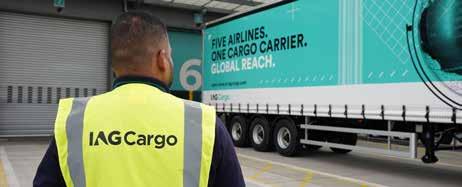
n IAG Cargo, the cargo division of International Airlines Group (IAG), has delivered revenues of €629 million for H1 2025 - an increase of 11.1 per cent on the same period last year.
Despite evolving market conditions, the business demonstrated resilience, with volumes up 4.5 per cent and yields 6.4 per cent higher compared to H1 2024.
“Following the strong growth we achieved in 2024, this performance reflects the trust our customers place in IAG Cargo to deliver reliably, even as global supply chains remain under
pressure,” said David Shepherd, Chief Executive Officer of IAG Cargo. “We have continued to invest in areas that drive long-term value, improving operational performance, modernising key processes, and building a business that is more agile, predictable and responsive to customer needs.”
Digital transformation and operational excellence
IAG Cargo’s transformation roadmap continues to drive strong performance, underpinned by strategic investment
DMCC hosts first roadshow in Indonesia
n DMCC, the leading international business district that drives the flow of global trade through Dubai, has concluded its first-ever Made For Trade Live (MFTL) roadshow in Jakarta, reinforcing the growing economic partnership between the United Arab
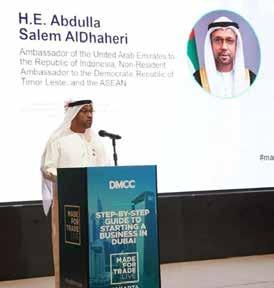
Emirates and Indonesia. During the event, DMCC announced a 13% increase in Southeast Asian companies within its business district in the past 12 months –taking its total to more than 650 Southeast Asian companies, including over 30 from Indonesia.
Following the landmark signing of the UAE-Indonesia Comprehensive Economic Partnership Agreement (CEPA), which entered into force in 2023, both countries have seen a rapid increase in trade and investment. Bilateral non-oil trade grew from USD 3 billion in 2020 to USD 5 billion in 2024 – a near-doubling in four years –while outward investment from the UAE has kickstarted major new projects in strategic sectors from renewable energy to advanced tech infrastructure, opening up new avenues for collaboration.
Capitalising on this momentum, DMCC sees key opportunities to engage with Indonesian businesses and attract investment across sectors such as energy, agri-food, technology and the Islamic
in digital innovation and service improvement. Recent developments include enhancements in responsiveness, optimisation of cargo flow, and strengthening capacity planning. These include real-time cargo tracking, predictive insights, enhanced self-serve functionality on its website and the integration of agile pricing systems.
“We are seeing real momentum from our focus on operational excellence and accelerating our digital offering,” added Shepherd. “It is enabling us to serve our customers better, drive efficiency and move at the pace the market demands.”
Market highlights
Shepherd adds, “This partnership opens a world of new possibilities for our customers. By combining our networks, we will be able to offer greater routing flexibility and expanded capacity across key trade lanes connecting Asia Pacific, the Middle East, Africa, Europe, the Indian Subcontinent, and the Americas.
economy. DMCC’s subsidiary the Dubai Gold & Commodities Exchange (DGCX) recently announced a strong first half of trading, with a key highlight being its Shariah-compliant Gold Spot Contract (DGSG) which jumped by almost 200% in value year-on-year to reach USD 46.8 million. In April, DMCC Tradeflow – its online platform for the registration and ownership of commodities stored in UAE facilities – appointed a Shariah Supervisory Board to oversee its Islamic finance offering and adherence to the highest ethical and regulatory standards.
His Excellency Abdulla Salem AlDhaheri, Ambassador of the UAE to the Republic of Indonesia, to the Democratic Republic of Timor–Leste, and the ASEAN, said: “It is a privilege to participate in the Made for Trade Live event, organised by DMCC in partnership with the UAE Embassy in Jakarta and KADIN Indonesia. This event is not simply a meeting – it is a gateway for Indonesian partners to see firsthand the opportunities that the UAE offers to live, work, invest, and succeed.”
•
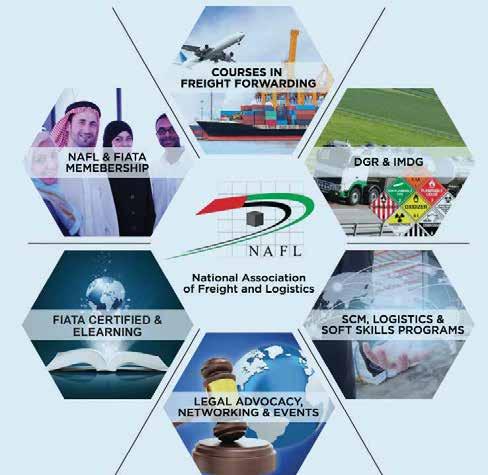

International Benefits:
+ The FIATA member certificate
+ Use of the Fiata logo
+ Entry in the FIATA members directory & networking events




+ Advertising in the FIATA members directory, review and information (FIATA e-Flash)
+ Special Rates for FIATA publication and articles
+ Access to secretariat›s assistance
+ FIATA arbitration code
+ Use of FIATA documents
+ FIATA worldwide member connectivity
+ Talent Connect Worldwide, E-Learning

+ Discountes rates in participating in global and regional conferences
+ Asssistance in case of legal advocacy
+ Discounts for cargo/logistic events and exhibition stands
+ Discount training for NAFL members
+ Training/Certification for regional/international courses
+ Insurance at discounted rates (cargo/liability/medical)
+ Complimentary internship, Skill upgrade and Mentoring & Innovation ideas
+ Discounted supplier rates for industry products

Etihad Rail to ‘Open up new corridors across the Emirates’
n A UAE property expert says the benefits delivered by Etihad Rail will extend far beyond real estate, creating new corridors for living, trade, and investment across the Emirates.Firas Al Msaddi, CEO of fam Properties, believes the Etihad Rail network will transform the UAE’s economic landscape by boosting connectivity, reducing travel times, and driving genuine demand in emerging markets.
Firas Al Msaddi, CEO of fam Properties, believes the Etihad Rail network will transform the UAE’s economic landscape.
“We’re not just talking about transportation. We’re talking about speed, interconnectivity, and productivity, and how all of that compresses space and time. And when you compress space and time, you reduce opportunity cost. That’s where the
real value is unlocked.”
“Etihad Rail isn’t just a train, it’s a full-scale economic reset for the UAE. It will shift demand patterns, eliminate bottlenecks, and open up new corridors for living, trade, and investment. Etihad Rail changes that. When you cut travel time from 2 hours to 50 minutes between cities, you don’t just save time, you reshape where people choose to live, work, and invest.”
“What used to be too far is suddenly next door. Fujairah is no longer the end of the UAE, it’s the Eastern gateway. Al Ain becomes a realistic base for remote professionals who can now be in the capital or the coast in under an hour. This creates a complete re-pricing of land value, not based on geography, but based on accessibility.”
Al Msaddi cites the example of Japan’s
bullet train between Tokyo and Osaka, which transformed cities like Nagoya in just five years. “Commercial land values rose over 40%, and housing demand surged more than 60%,” he said. “It wasn’t about the train itself, but the economic flow unlocked by faster travel.”
Pointing to the impact on logistics, B2B supply chains, and the decentralisation of corporate ecosystems, Al Msaddi says the equation most investors overlook is that faster travel means more meetings and more transactions.
“A salesperson based in Sharjah can now close deals in Abu Dhabi and Dubai without losing six hours to traffic,” he says. “That boosts output. Multiply that across the commercial class, and you start seeing real GDP impact.”
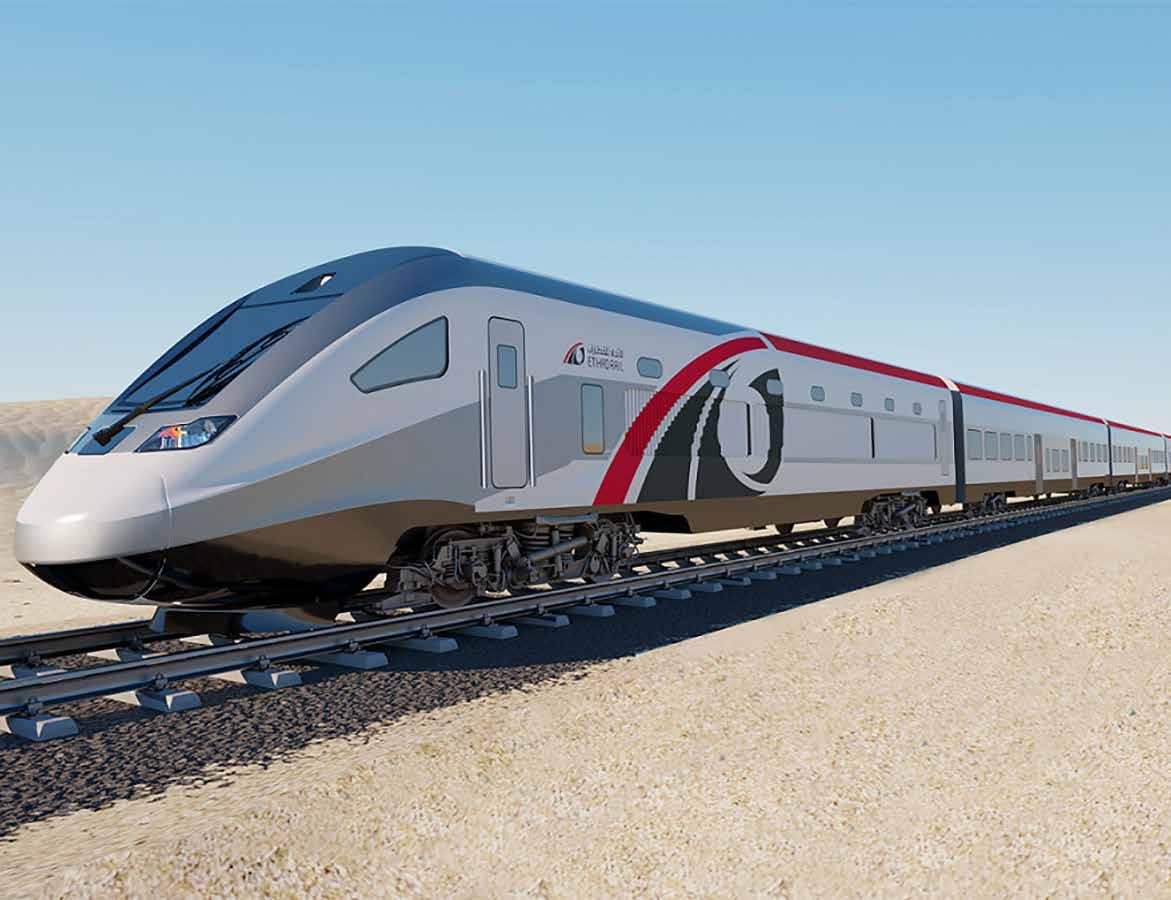


KEY SECTORS

CTW Global will provide many valuable opportunities to connect with a wide range of individuals who share a common interest in the industry, products, and services being showcased.





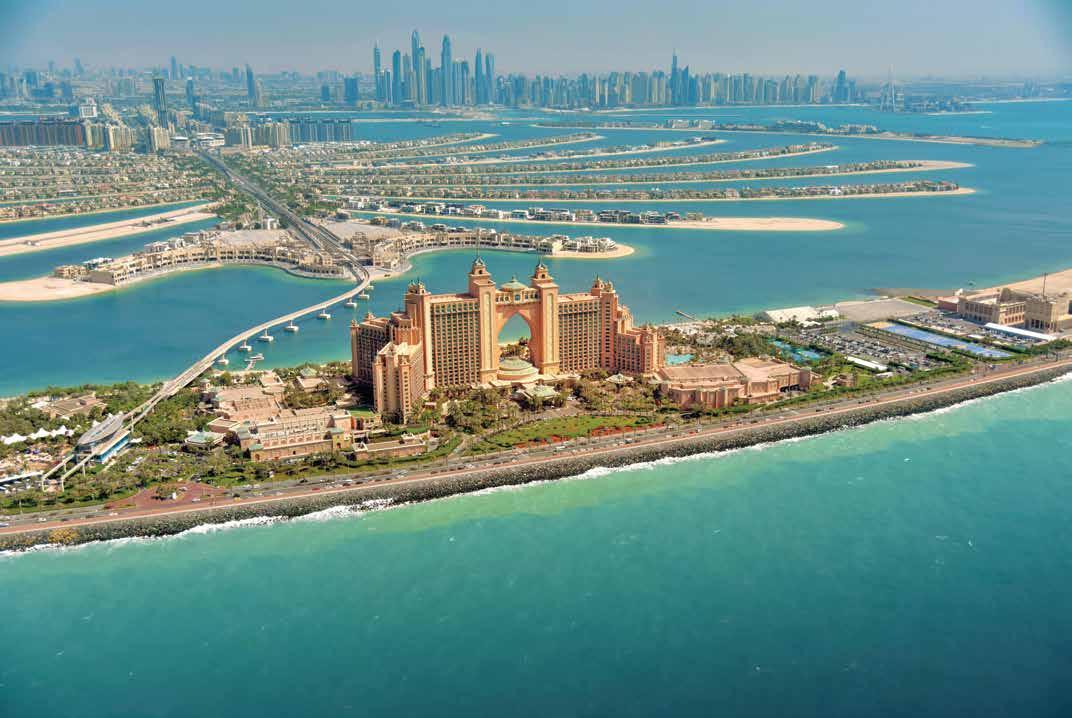


Menzies Aviation set to expand MASIL operations at Mosul International Airport
n Menzies Aviation, the leading service partner to the world’s airports and airlines, has announced it will deliver ground, air cargo and fuelling services at Mosul International Airport (OSM) in Iraq through MASIL, its joint venture with Iraqi Airways, Air BP and Al-Burhan Group.
One fully operational, MASIL will provide a full suite of aviation services at OSM, under a new 10-year license, further strengthening its footprint in the region. This builds on MASIL’s operations at Baghdad International Airport (BGW).
MASIL provided ground services for the presidential flight that signified the official reopening of OSM. The flight, attended by Iraq’s Prime Minister Mohammed Shia’ Al
Sudani, represented a landmark moment in the airport’s history, which has been nonoperational since 2014.
The milestone underscores the joint venture’s capabilities and readiness to support future air traffic at the revitalised airport.
Mosul International Airport has undergone extensive reconstruction and is now equipped with a main terminal, VIP lounge, and advanced radar surveillance system. The airport is expected to be fully operational within the coming months, supporting both domestic and international flights and handling an estimated 630,000 passengers annually.
The expansion marks a significant milestone in the continued growth of
the MASIL joint venture across Iraq and demonstrates Menzies’ commitment to supporting the country’s aviation infrastructure and long-term development.
Charles Wyley, Executive Vice President Middle East, Africa and Asia, Menzies Aviation, said: “We’re proud to expand our presence in Iraq with new operations at Mosul International Airport through our MASIL joint venture. This is a major step in our journey to support the redevelopment of Iraq’s aviation sector and bring worldclass standards to the country’s airports.
Handling the presidential flight was a privilege and a clear signal of MASIL’s professionalism and reliability as a trusted service provider.”
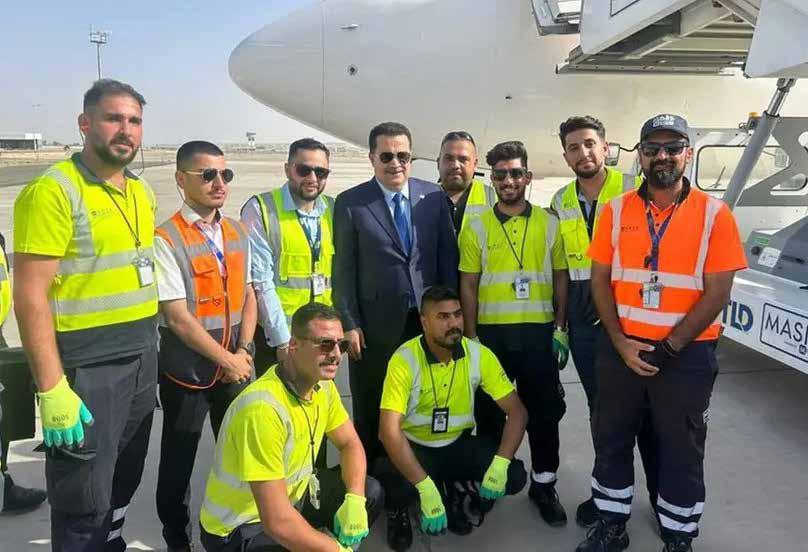
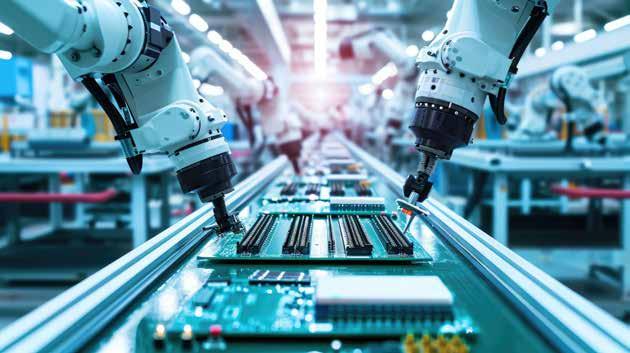
Emirates updates safety rules for power bank use onboard

n Using any kind of power bank is prohibited onboard Emirates’ flights, effective from October 1,2025. A power bank is a portable, rechargeable device primarily designed to provide power to other electronic devices such smart phones, tablets, laptops and cameras.
Emirates customers are still permitted to carry one power bank onboard with specific conditions listed below, but the power banks may not be used while in the aircraft cabin – neither to charge devices from the power bank, nor to be charged themselves using the aircrafts’ power source.
Emirates’ new regulations include:
• Emirates customers may carry one power bank that is under 100 Watt Hours.
• Power banks may not be used to charge any personal devices onboard.
• Charging a power bank using the aircraft’s power supply is not permitted.
• All power banks accepted for transport must have capacity
rating information available.
• Power banks may not be placed in the overhead stowage bin onboard the aircraft and must now be placed in the seat pocket or in a bag under the seat in front of you.
• Power banks are not permitted in checked luggage (existing rule).
Why this change?
After a comprehensive safety review, Emirates is taking a firm and proactive stance to mitigate risk when it comes to power banks onboard.
There has been a significant growth in customers using power banks in recent years, resulting in an increasing number of lithium battery-related incidents onboard flights across the wider aviation industry.
Power banks primarily utilise lithiumion or lithium-polymer batteries, and their function is as a portable battery pack designed to recharge devices on the go.
The batteries contain lithium ions suspended in an electrolyte solution.
The ions flow through the electrolyte, travelling back and forth
between two electrodes as the battery charges and discharges.
If the battery is overcharged or damaged, it may result in ‘thermal runaway.’ Thermal runaway in batteries is a self-accelerating process where heat generation within a battery cell exceeds its ability to dissipate heat, leading to a rapid and uncontrollable temperature increase.
This can result in dangerous consequences like fire, explosions, and the release of toxic gases.
Most phones and sophisticated lithium battery-powered devices have an internal trickle system which slowly adds current into the battery to prevent overcharging, but many basic power banks may not have this safeguard, increasing the risk.
All power banks are subject to the new rules onboard Emirates.
Emirates new regulations will significantly reduce risks associated with power banks by prohibiting their use while onboard the aircraft.
Storing power banks in accessible locations within the cabin ensures that in the rare event of a fire, trained cabin crew can quickly respond and extinguish the fire.
Kia PV5 Tech Day: technology for limitless mobility
- Kia PV5 utilizes Hyundai Motor Group’s new Platform Beyond Vehicle (PBV) architecture, the ElectricGlobal Modular Platform for Service (E-GMP.S), to optimise space and safety

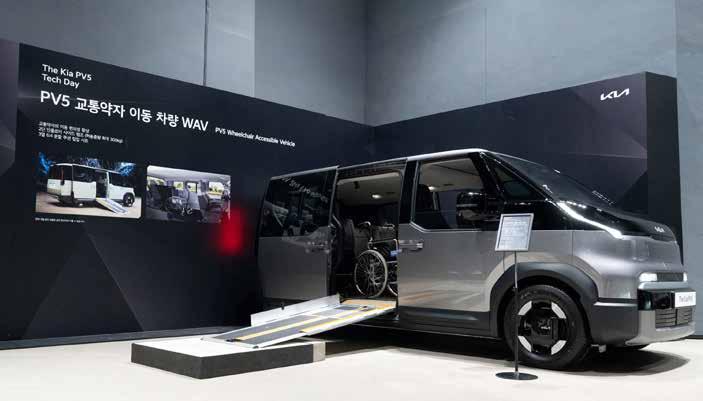
n Kia Corporation recently held ‘The Kia PV5 Tech Day’ at the IVEX Studio in Gwangmyeong, unveiling the development story, core concept and next-generation technologies behind its first dedicated Platform Beyond Vehicle (PBV), the Kia PV5.
In line with its global strategy to provide sustainable mobility solutions for all, Kia is setting a new benchmark for the rapidly evolving PBV market with the PV5, which is now moving into mass production with next-generation platform engineering and customerled product development at its core.
Held under the theme “Technology that adapts, mobility that expands”, the event showcased Kia’s strategy to deliver flexible, future-ready mobility solutions that transcend traditional commercial vehicles
— strengthening its position as a leader in sustainable, customer-driven innovation.
“The Kia PV5 is more than a vehicle –it’s the starting point of an entirely new, revolutionary, flexible mobility ecosystem shaped by real customer input from day one,” said Seokha Ju, Vice President and Head of MSV Project Group 3 at R&D Division. “Our dedicated PBV platform and conversion ecosystem prove that Kia’s PBVs can adapt to almost any need — redefining how people and businesses move.”
Customer-led development for maximum usability
Kia hosted PBV Partners Day in 2022 and 2023, gathering over 120 customers from Korea, Europe, North America, the Middle East and Japan. These partners
contributed hands-on feedback based on real-world business needs across mobility, logistics, delivery and utilities.
It also worked closely with mobilityimpaired users to develop the PV5 WAV (Wheelchair Accessible Vehicle), featuring a gentle-sloped side-entry ramp, universal securing systems and a spacious low floor — addressing accessibility needs often overlooked in the segment.
At the heart of the PV5 is Hyundai Motor Group’s (HMG) first dedicated PBV platform — the Electric-Global Modular Platform for Service (E-GMP.S). Building on the Group’s proven E-GMP EV technology, E-GMP.S features an Integrated Modular Architecture (IMA) that standardizes complex systems — including batteries, motors, suspension and underbody structures — to simplify development.
“What makes AVGO truly different is our proactivity”
As the Founder of AVGO Logistics, Geoff Oswald believes in investing in his employee’s wellbeing. His company has established itself as the no.1 choice for Dangerous Goods since 2006. Over the years it has evolved into a full-service all-in-one logistics provider offering warehousing in free zone or on mainland, paired with other supporting services. “Our people who all own a part of our business, work to keep you informed about your shipments as and when they move from origin to destination,” says Oswald. Our Editor discovers more about this logistics maverick.
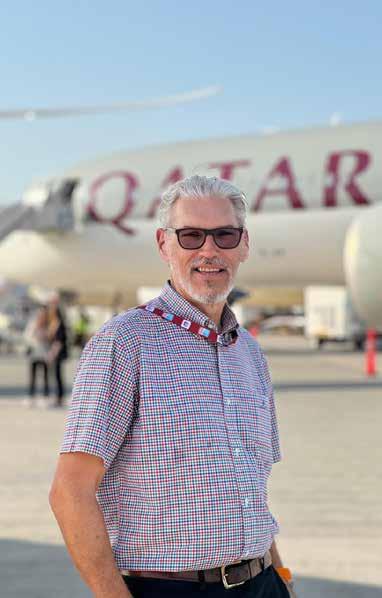
Abigail Mathias: What’s your typical day like?
Geoff Oswald: I’m the office between 7 and 7.30 am so I can plan my day. I like to also give my team the reassurance of my presence when they walk in and leave to go home. I take time with each of the departments to tackle any issues together and get updates on the ongoing items.
Are you a coffee or tea person?
If so, how many cups a day?
As Englishmen you might think tea but black coffee is my preference accompanied by something chocolatey.
What do you do to keep yourself fit?
I practice intermittent fasting to balance my food intake and play golf a couple of times a week to keep moving.
What time do you break for lunch?
When you haven’t eaten since 7pm the evening before you welcome the 11am lunch break.
AM: To me and our association Global Supply Chain Magazine is… GO: A great medium to communicate on the issues affecting us in the logistics industry to know our fellow industry professionals.
AM: Around what time of day do you wrap up work at the office?
GO: Any time after 6pm but depends on what’s going on.
AM: How do you unwind in the evening?
GO: TV is a favourite in the summer and in the cooler weather an evening out with friends.
AM: When and to which location is your next holiday?
GO: Currently on holiday In Malaysia. The next one will be in South Africa during early 2026 for a golf trip.
AM: What advice would you’d give other business professionals juggling time?
GO: Get more staff, no, but seriously, time management is the key for me. Know where you add value and do that otherwise assign it to other team members.
AM: When do you catch up on world/business events?
GO: In the evening or during a lunch break.
AM: What do you hope to achieve in the logistics arena in the next five years?
GO: 18 months ago I gave shares to every employee so they get something back for their loyalty and hard work so I want to ensure we continue to grow and give back to the staff.

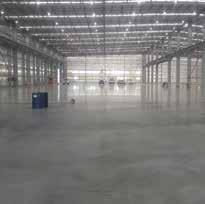

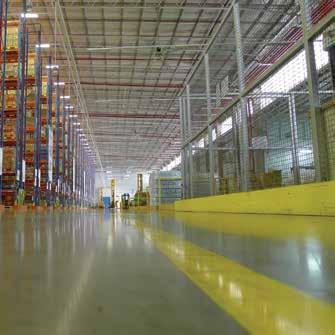
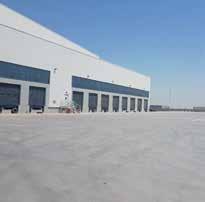
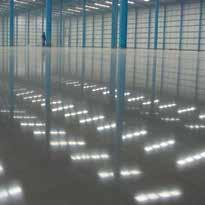
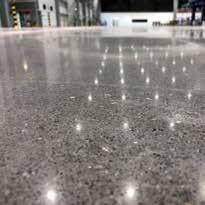
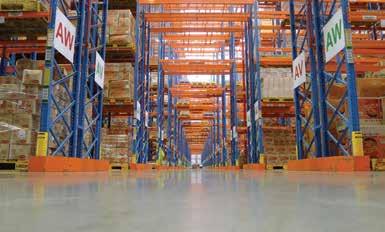
Discover our winter shedule

Explore our new winter schedule with new destinations and additional frequencies
